#and then another section about the different historical names for the person who is your biological mother's biological full sibling (femal
Explore tagged Tumblr posts
Text
#starting to lean into the world is fucked so passion projects are go#about me#fantasy#worldbuilding#DM ideas#GM ideas#rpgs#D&D#poll#for more info:#I'm just imaging this book would have like#first a chapter on the terms for the parts of a door#and then a whole wild survey of different materials that peoples around the world use for walls or roads#and then another section about the different historical names for the person who is your biological mother's biological full sibling (femal#because it's actually not always “aunt”#and then like death rites are cool everywhere#scots dialect alone has all these crazy words for terrain#so just#what if there were a catchall reference handbook thing#idk is this anything
3 notes
·
View notes
Text
Wherefore Art Thou Clownfucker?
A while back I made a post explaining why vampires appeal to me, and while it was mostly in a more general sense, there was a specific focus on why I find them, you know, hot. And it was that was in part because I had recently discovered that I'm apparently surrounded by Werewolf fuckers on here, much to my dismay as a Vampire fucker. It's like being the only goth kid at a rockabilly concert or something. I felt defensive, is the point! I needed to go to bat (heh) for my pale ladies (and Astarion.... and Spike)!
And now, because Muncher compels me to do so, I'm doing the same for Clowns. My other pale ladies.
Now, keep in mind the fact that I'm a monsterfucker first and foremost, and that my clownfuckery is really more derived from my monsterfuckery. I imagine the middle section of the Clownfucker/Monsterfucker diagram is pretty big, but I also know there are some clownfuckers who are very much NOT monsterfuckers, and vice versa. This is not the case for vampirefuckers, who are nestled firmly within the monsterfucker circle, because while all vampires are monsters, not all clowns are monsters. I bring this up because while I'm gonna try to explain clownfuckery on its own terms, there is likely going to be some monsterfucker bias in my explanations and defense. That's just how it is on this bitch of an earth!
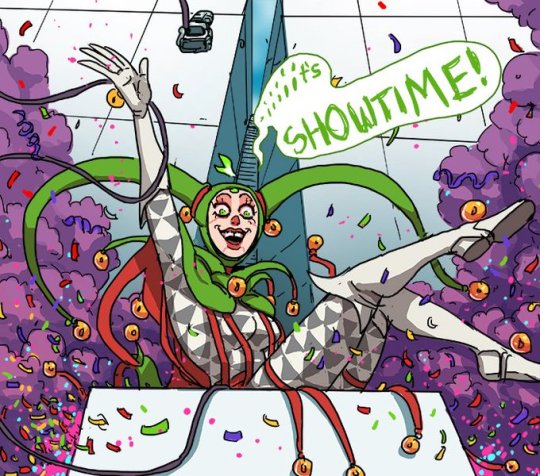
I'm gonna get real pretentious here and talk about the historic role of clowns for a moment. From Comedia del Arte harlequins to medieval court Jesters, the clown's role has always been that of Comic Relief. They are, simply put, here to be tonally dissonant - when everyone else is serious and dramatic, a clown comes in as this weird, silly, incongruously hilarious element that contrasts the gravity of everything around them. "Relief" is really the key word here - a clown's job is to provide levity when otherwise there would be none. When everything is dark, they provide a little light.
That's the core emotional appeal of clownfucking - a clown is/should be someone who can make you smile when you need it the most. Kingdom's at war, family's fighting, your life's in shambles? The clown will make you laugh. Everything feels dark and gloomy and depressing? Here comes a silly little goofball wearing bright, clashing colors and jingling with each step because they're covered in bells, and all they want to do is tell jokes until you start laughing. Clowns are, by intent, that sweet sweet hit of dopamine personified.
Clowns are here to make you smile.
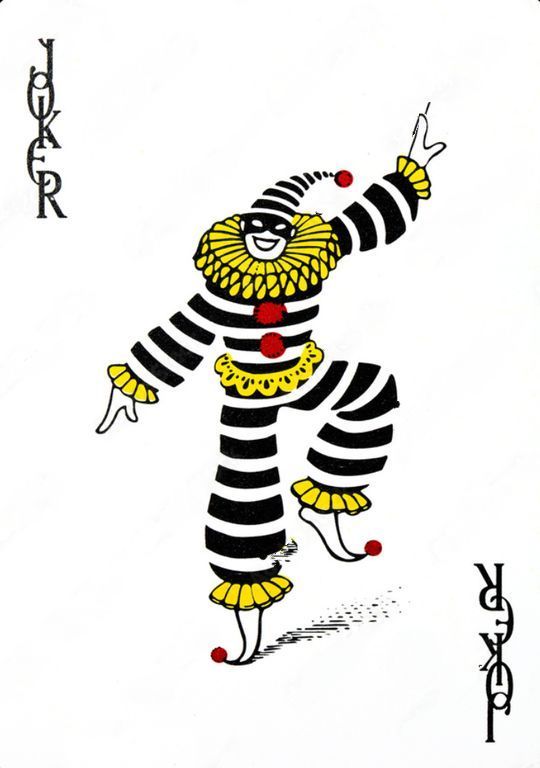
Another important historical detail about clowns is their unique place in the hierarchy of society - namely, being entirely outside of it. A jester was in some respects the lowest person on the totem pole, a fool that had power over no one and nothing, living to be laughed at. Yet, because they had no power over anyone, it was generally poor taste to take offense to anything a jester said, which meant they could talk more freely than anyone else - when everyone else acts like a butt-kissing sycophant, a jester is free to talk shit and speak their mind.
The traditional attire and appearance of clowns plays into both of these traits: the bright, gaudy clothing and makeup is silly, yes, but it's also a sign that the clown does not give a single shit about fashion and other social norms. A clown is, by nature, an anomaly, a misfit, a rebel.
Nowadays we have another word for people with that attitude. Clowns are punk.
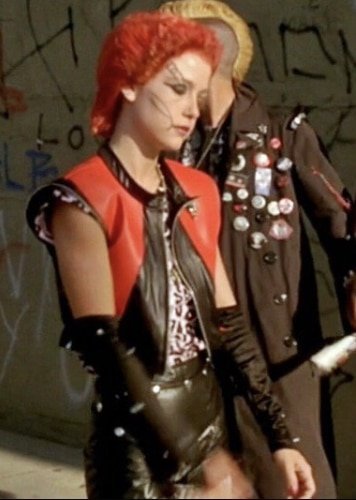
Weird makeup, crayola red hair, patchwork clothes...
I would say the very fact that "normal" people look at clownfucking as some sort of inexplicable fetish is, in fact, part of the appeal. It's a form of xenophilia, of attraction to things that are different and othered, a love for outsiders and misfits and oddballs. To fuck a clown is to show love and adoration for something outside of the realm of what is socially acceptable - something silly, goofy, and weird, yet also often harmless. After all, a clown's main purpose is to make you smile.
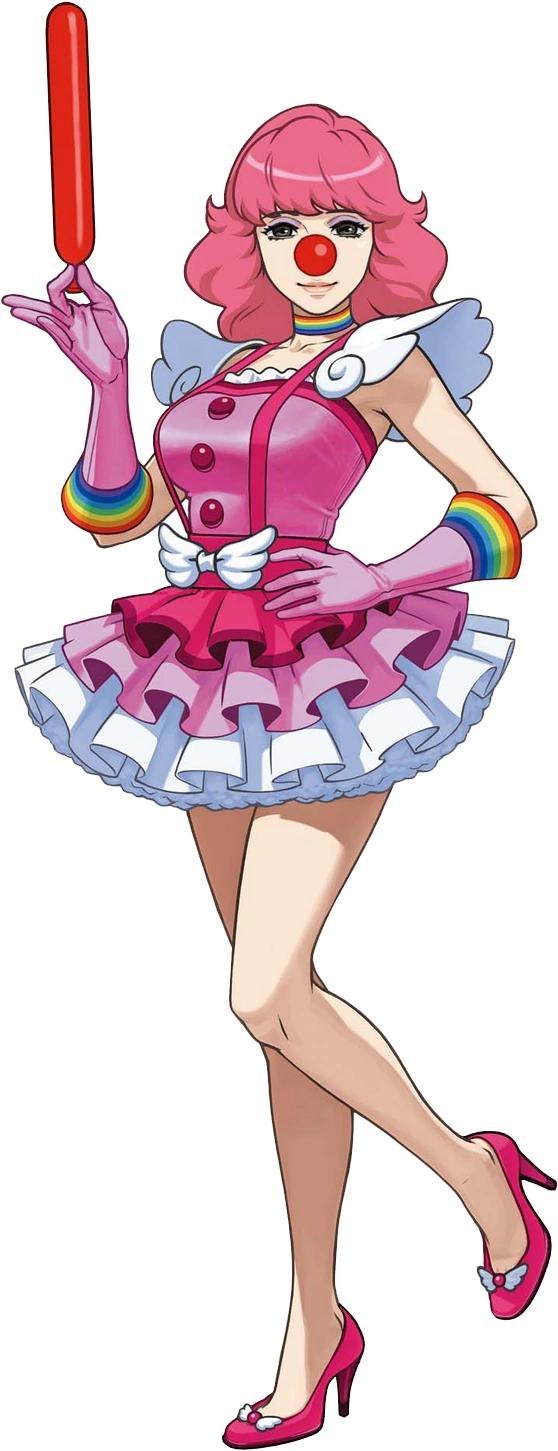
That's not to say that clowns have to be harmless to be attractive, mind you. Tons of people, many much smarter than I, have talked about the cultural shift of our perception of clowns that began somewhere in the 1980's. Clowns went from being viewed as genuinely fun and cute to primarily being figures of fear and terror - if a clown shows up in modern media, even if it's innocuous, there will always be at least one character who vocally talks about how creepy they think clowns are.
That may in part be due to the fact that clowns have such a benign mission statement - a lot of people, especially nowadays, do not trust a person who claims they just want to make others happy. Anyone who acts like that MUST be up to something - there must be something nefarious going on, some evil plan, some lurking danger.
Which is where you REALLY bring the monsterfuckers in.
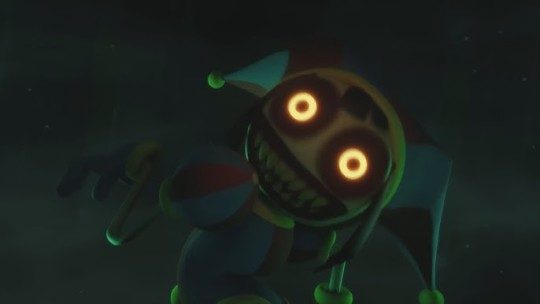
You really don't need to do that much with a clown's design to push it firmly into monster territory - "a pale person with sharp teeth" is the bare minimum it takes to make a vampire, after all (and even the pale part can be downplayed).
And a clown's dedication to making things "funny" can make for a very enjoyably-scary persona for a monster - hell, half the appeal of the Addams Family is that they're a bunch of freakish inhuman monsters who react to a bunch of scary shit with absolute delight and adoration. Again, the tonal dissonance element is at play here, albeit in a different way - even when Clowns are the darkness in your world, they still bring light in the sense that they view it that darkness as funny in of itself.
(hell, the word "harlequin" means "five horns," and may be rooted in folkloric monsters like Herne the Hunter depending on who you ask, so in a way clowns have always been monster-coded)
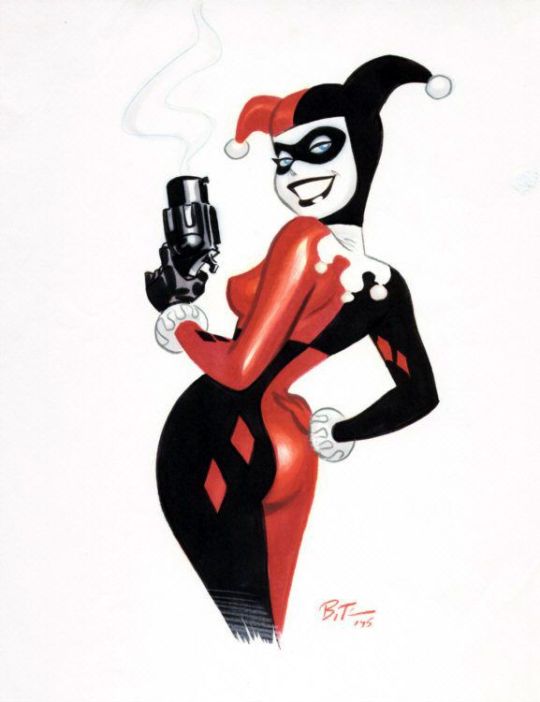
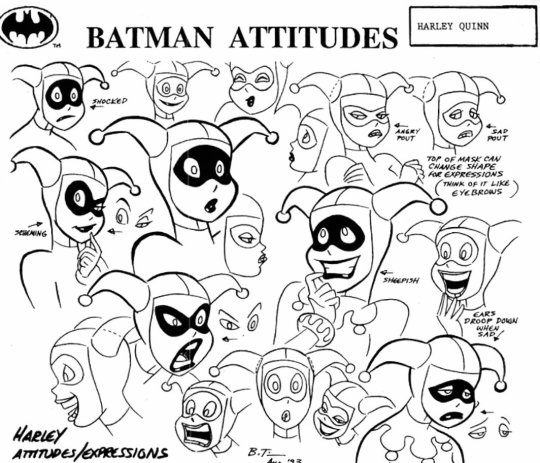
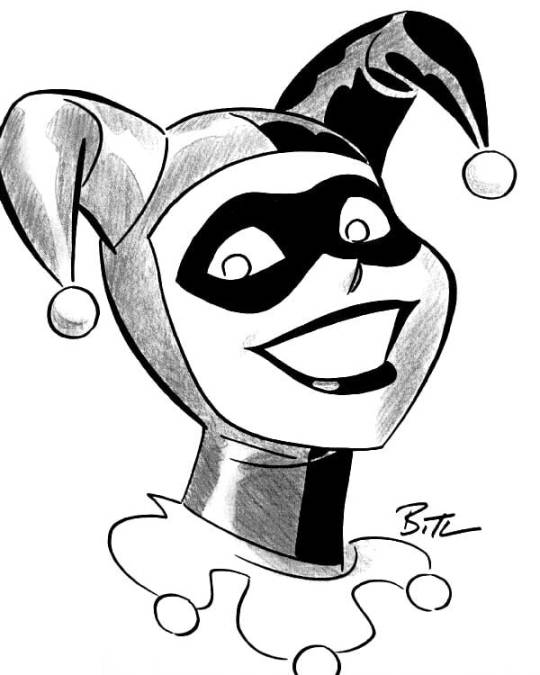
I think all of this is pretty well exemplified in the current Patron Saint of Clownfuckers, the goddess of Clownfuckery if you will, Harley Quinn. Hailing from a story whose main setting is such a Gothic Horror-inspired nightmarish shithole of a city that it's literally called Gotham, surrounded by characters who are at least 60% gothic horror archetypes by volume, opposed by a hero who literally dresses like a Dracula, it is inarguable that Harley Quinn is surrounded by darkness that's both literal and figurative.
But she's always smiling, and not in an ironic way.
Harley Quinn suffers intense abuse, she's drawn into wicked schemes, and in the way of most modern clowns, she causes no small amount of mayhem and suffering herself. But even at her darkest, she's always smiling, always trying to find the bright side.
She's a rebel, she's a punk. Almost everyone thinks she's beneath them. Almost all of those people get proven they're wrong. In a world full of tyrannical hierarchies, she steps outside of them.
She's an outsider, a misfit, an oddball. And she wants to make you smile.
I think you can probably see the appeal of that.
38 notes
·
View notes
Text
as a natural skeptic i’m gonna be real with you. i’m slamming the brakes on this whole religion thing before i figure out what it really is that i believe. one thing i know for certain is that i don’t think my experiences of the world relate to what you call “hard polytheism” at all, so i will be refraining from referring to myself as “pagan” or “heathen” or similar terms from here on out — as i learned from reddit, actual pagans, i.e. those of you who believe that the Gods from whatever pantheon you follow are literal, actual, 100% independent, non-anthropogenic, non-metaphoric entities, tend to frown upon talk of “archetypes” and co. i don’t want to be seen as insulting your Gods with my home-brewed eclectic woo-woo nonsense, so i’ll keep at an arm’s length until i’m one hundred percent sure that i can defend my own beliefs because i know what they are.
i personally lean towards the chaos magic side of approaching these concepts — although, truth be told, i need to do more reading. a lot more reading. but once again, i stress, personally, i find myself far more comfortable with the concept of egregores. metaphysical entities, congregations of energy and intent, that have been given power and consciousness through centuries of dedicated devotion and prayer from humans. if enough people direct their thoughts towards an idea for long enough, leave offerings for that idea, hold festivities in its honour, write poetry and paint artworks depicting and praising it, then it’s no wonder if it gains a mind and will of its own. i lean towards the idea of deities/other spirit entities as personified aspects of the universe, as currents of energy or patterns of thought or representations of natural phenomena that were given different (or many) names in different historical/geographic contexts and have taken on a semi-solid shape with time
which is to say, i don’t know whether the Presence that has been visiting me — the one that rekindled/sparked/ignited my interest in all of this, pun quite intended if you know who i’m talking about, is genuinely the ambiguous, controversial Norse deity that i have been referring to Them as; whether They are some kind of thoughtform or another separate spirit; a manifestation of my subconscious desire to “Aren’t You Tired Of Being Nice Don’t You Just Wanna Go A Little Apeshit”; or a character i Made Up In My Head (not outside of the scope of possibility, knowing my tendency to spot patterns where there aren’t any). i’m treading with caution. that’s what you do. because after doing some wider research, i really, really don’t wish to be associated with that sort of person — you know the one. edgy. rebellious kid. doesn’t know what they’re talking about. witchtoker
after all, i did come here through pop culture. so, maybe, all this ends up being is another hyperfixation on mythology. i’ve had those before as a way younger teen — thanks, uncle rick. don’t really know how to conclude this, so: i’ll get more educated and get back to you. if any of you (you know who you are) have any BOOK or ARTICLE RECOMMENDATIONS based on what i’ve said above, please don’t hesitate to PUT THEM IN THE COMMENT SECTION
xoxo, ivy
#ivy.txt#ivy’s witchery#beginner witch#beginner pagan#soft polytheism#chaos magick#lokean#loki deity#eclectic witch
20 notes
·
View notes
Text
~ Character Info Sheet
name: Sibahl Khan Noonien Singh
name meaning: 'Khan', often a surname, is derived from the historic title khan, referring to a military chief or royalty. Ruler, leader, king. / 'Noonien' is of Chinese origin and means "gifted one". The story goes that Gene Roddenberry, in the midst of the Cold War, was attempting to find a friend with this name and hoped seeing it on the big screen would enable them to connect again. / 'Singh' is a Punjabi/Sikh surname, derived from the Sanskrit word सिंह (IAST: siṃha) meaning "lion", and is used in the sense of "hero" or "eminent person". ['Sibahl' is rooted from two different sanskrit words: 'singh' which means lion and 'bal' which means strength.]
tl;dr his name is an amalgamation of different cultural roots, while the general meanings remain consistent.
alias/es: The Augmented Prince, The Augmented Tyrant, John Harrison, Captain, Popsicle, KHAAAAN
ethnicity: indian british now ig thanks section 31 ┐('~`;)��
one picture you like best of your chara:
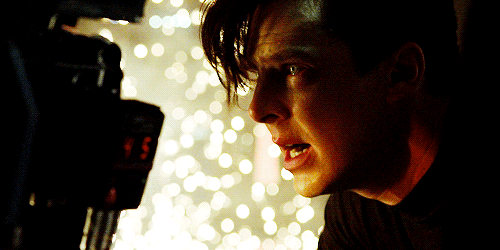
and his alternate fc b/c i have no chill:
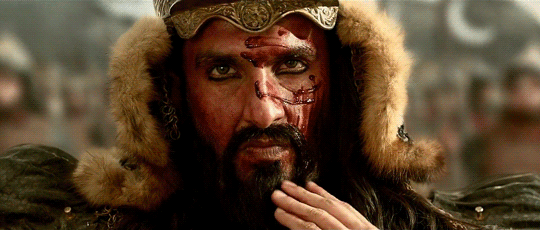
three h/cs you've never told anyone:
His name, I suppose. Learning that 'Khan Noonien Singh' was not the original name for the character sort of set me off, along with the moment in the comic where he took on a new moniker. Sibahl is the name that Sarina gave him, and sometimes he still tastes it in the back of his throat; yet when he'd realized what he must become to lead his people, he shed it in favor of KHAN.
While he fears failure and loss, Khan does not fear death. Truthfully, he finds the concept comforting in a way that words can barely describe. To return to the earth, to stardust, is so unfathomably beautiful-- to continue the cycle of life until it dissipates in entirety. His body will feed the soil, bacteria and carrion consuming all that he has to offer, and so he will live on and on in a way that the soul cannot. He's absolutely written poetry about it, and you'll never get to read it.
When he was a child, he was gifted a khanda by a close friend of Sarina's-- a historian and antique dealer. While it was originally ornamental in design, Khan sharpened and modified it to become a functional weapon.
While I generally consider him unable to scar, a wound from a previous rp partner yet transcends many of his verses. It's a scar just under his rib cage on the left side, vaguely in the shape of a sunburst.
three things your character likes doing in their free time:
Calligraphy-- he misses paper and ink, how his hands long to create instead of destroy.
Playing chess-- a way to destress while keeping the mind sharp.
Whittling-- he has occasionally been known to gift woodwork he's created. Not as often in his current timeline.
eight people your character likes / loves:
Marla McGivers (@sweetbitterbitten): A mad widower does not a worth leader make. Without her, insanity is the best comfort that can be had. With her-- oh, with her, Persephone to his Hades, he is fit to rule in hell. He is fit to drag it wherever he needs it to be.
Fox Alkaev (@vuulpecula): After writing him for so long, Fox has become interwoven into his story, in some way or another. In every verse, he is somehow connected to her.
Sarina Kaur: Mother is God in the eyes of a child.
Joachim: What is a king without an advisor? This is his right hand man and greatest confidant.
Kati: Much like Joachim, he relies on her wisdom, either as a dampener to his righteous fury, or a kindling when blood must be shed.
Liesel Ivanov (@noblehcart ): Who else can dance only to melody of humming stars and thrumming hearts?
His unnamed child from Wrath of Khan/Ender (@middaysandmidnights): His child, his legacy, his lifeblood. The one whom he hopes will endure despite him.
The rest of his crew: without them, he is nothing, a dead end king, a freedom fighter without a cause.
Multiple muses that have melted his icy heart over the years. I'd make a giant post if you'd let me.
two things your character regrets:
Terran exile, and how long it has taken to regain a rightful throne. He wishes that he hadn't relied on the unknown to save them.
Letting any of his people die. Those that have still haunt him, ghosts ever present, continually chanting, "Our captain has left us behind."
two phobias your character has:
Claustrommetaphobia - fear of suffocation in an enclosed space.
Atychiphobia - an extreme fear of failure.
Tagged by : @ssolessurvivor <333
Tagging: @gcldenratio @asteritm @jundlcndwastes (juni!) @hcxcd @noblehcart (liesel!) @lastsurvivor @sweetbitterbitten (whomever you're feeling the most; or marla!) @vulku / @greatprotector @admiralchristopherpike @godresembled (rey!) @whydotheykeeptakingmine @learnedlucidity @hiislegacy @weavefcrged @primitiveside @dethqveen and YOU!
#x: MY NAME IS KHAN (about.)#headcanon.#it's difficult to remember thing i haven't already talked about a million times before#x: YOU SHOULD HAVE LET ME SLEEP (queue.)#*things
23 notes
·
View notes
Text
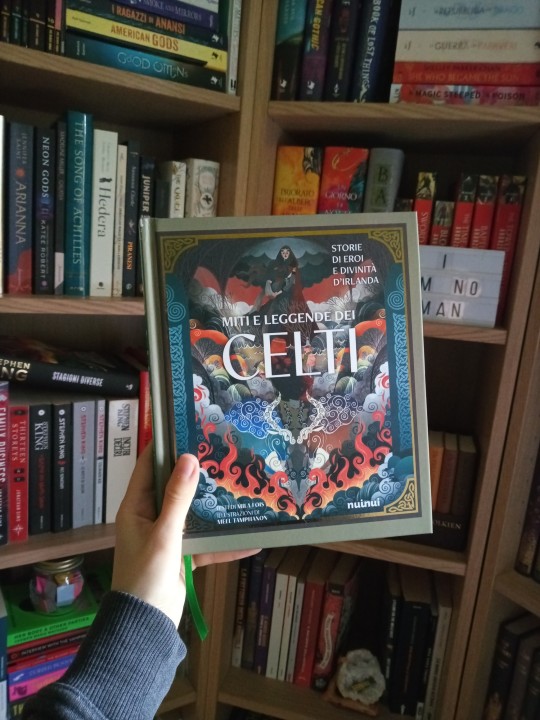
Miti E Leggende Dei Celti by Mila Fois
This is going to be a long one. So, I got this book a couple of weeks ago because of two reasons. Firstly I have been looking for a book on Celtic myths for a long time, and secondly this looked like a very nice and curated edition. It's illustrated with a lovely artstyle, overall it's one of those books that calls to you when you see it on a book shelf. My opinions on the book itself have to be devided in two sections, the first being the actual story so the myths and legeds which of course are traditional tales and not the author's idea, and the way the author decided to work on said stories, presenting them to the public and so on. I have to do this because I absolutely despised the book but I actually liked the stories. The thing is that I am very very frustrated with the author and the publisher whoever is responsible for this, but let's talk about one thing at the time. The stories were fine, it was my first time actually approaching them, and though I didn't love the narration style of the author I enjoyed my time with them. I would love to read another's author's approach at telling these tales, because overall I would love to learn more about Irish traditional myths and tales. I am using the word Irish instead of Celtic because at the end of the day that's what the book should have been called. Yes, most of these stories are Celtic myths, but part of the book is just Irish folklore and it's not addressed, moreover two stories end with Irealand being already christianized? This is one of the first things that didn't make me happy because how can it be a Celtic myth if it ends with their own change of fate? And I believe this introduces well the general problem of this book, it's very imprecise and superficial. I am aware it's not an academic text, but still that is not an excuse for how imprecise it is and it wasn't even a cheap book. There's absolutely no glossary or notes that explain some words that believe me an average Italian person who has never read on the topic before wouldn't know and would have to google (and this is a book made for people who would just like to dive in myths as stories for fun). There's no guide to pronunciation, and that would have been needed even if in a small form, because of course Gaeilge has very different sounds than Italian so why not help the reader? And finally continuing on the imprecisions I think they made a poor choice of translation that needed a note to be contextualized. I am getting into the specifics but the historian in me gets frustrated easily with this stuff, because I don't understand how you can publish something is badly curated and misinformation go on even if it's a small thing, it just doesn't sit right with me especially since the author apparently graduated cum laude with a thesis in history of religions. Anyway the thing is of course fae folk are mentioned and since there is not a precise Italian translation of the term the author used a couple of other creature names that are kinda similar, but not the same thing since we are talking about different traditions. Nowhere in the book there was a note explaining that "hey I decided to use said and said word because of x reason but bear in mind that they are different creatures in such a way". I am so annoyed at how poorly it was curated, the tales are worth it but not in this form, and again the fact that someone who seems to have graduated in the history of religions should not have made these approximations. It feels like betrayal from within your household, there's already so much misinformation and approximation on historical matters, so especially since this is not an academic text but something that anyone would pick up you should be extra-careful in the way you expose things, and the informations you decide to put out in the world.
#if anyone has any good celtic myths / irish legends book recs i am all hears#this post falls more under the book rant than the book review but oh well#the more i think about this book the more frustrated I get uuuuugh#it was totally crafted with the goal of selling and not the goal of giving out a story and informations and it's criminal#book#bookblr#booklr#book rant#book cover#book rec#book review#book recommendation#mine#the---hermit
11 notes
·
View notes
Text
Creating Your Own History: Archival Themes in "The Watermelon Woman" [Part 1]
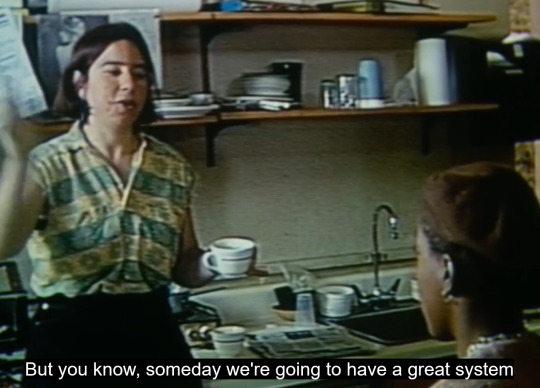
An archivist speaks to the film’s protagonist about having a “great system” to organize archival records within the community archive.
The Core Values Statement of the Society of American Archivists says that archivists should expand access, respect diversity found in humanity, and advocate for archival collections that reflect humanity’s complexity. [1] The reality is often different from that ideal in a field that is overwhelmingly White, as a recent article about Black archives pointed out. [2] This is evident in Cheryl Dunye’s 1996 romantic comedy-drama film, The Watermelon Woman, which the Library of Congress added to the National Film Registry in December 2021 for being “culturally, historically, or aesthetically significant.” [3] The film follows the story of one Black woman’s determined effort to create her own history and connect with the past. Although this eighty-six-minute mockumentary is over twenty-six years old, its themes of archival limits, power, silences, erasure, and fabrication continue to resonate today.
Reprinted from The American Archivist Reviews Portal. Thanks to Rose and Stephanie for their editing of this article! It was also posted on my Wading Through the Cultural Stacks WordPress blog on Jul. 5, 2022. This review contains some spoilers for the film The Watermelon Woman.
In the film, Cheryl Dunye plays a videographer (also named Cheryl Dunye) who works at a video rental store in Philadelphia with her friend Tamara (played by Valarie Walker). Cheryl watches a videocassette of an old 1930s film, Plantation Memories, and becomes interested in the character Elsie, a stereotypical ‘mammy’ character credited as “The Watermelon Woman.” She then strives to learn more about the actress who played Elsie. One of the first places Cheryl looks is in the basement of her mother’s house. Cheryl tells the audience that her mother, played by Irene Dunye, who is Cheryl’s mother in real life, throws nothing away. She says that Irene’s filing system needs updating. Her mother tells her about the films she watched growing up in the 1930s and notes that she saw “Elsie” singing in some clubs.
Cheryl continues her dogged search by talking to a person with a collection of old Black films and then traveling to the local public library, likely the Free Library of Philadelphia. After perusing the stacks, she checks out as many books as she can and talks to the reference librarian, a White man who is played by David Rakoff. Wanting information about the Watermelon Woman, she encounters her first archival limit, which scholars Sue McKemmish, Michael Piggott, Barbara Reed, Frank Upward, Jocelyn Fenton Stitt, and Sarah Tyson define as barriers created when documents pass into the hands of archival institutions from those who created them, inhibiting attempts to use records to tell family stories and circumscribing efforts to reclaim records about enslaved people. [4]
The librarian dismissively tells Cheryl to check the “Black,��� “film,” and “women” sections of reference books for information about the Watermelon Woman. With much prodding, he eventually searches his computer and identifies Martha Page as the film’s director, telling Cheryl that information about Page is on a reserve desk on another floor. Although reserve desks serve students and faculty with materials typically meant for university courses, Cheryl is given an exception and is able to access the relevant information for her research. Yet, she is still unsuccessful because the materials she looks at don’t have exactly what she is looking for.
© 2022 Burkely Hermann. All rights reserved.
Notes
[1] “SAA Core Values Statement and Code of Ethics,” Society of American Archivists, accessed February 20, 2022, https://www2.archivists.org/statements/saa-core-values-statement-and-code-of-ethics.
[2] Harmeet Kaur, “How Black Archives Are Highlighting Overlooked Parts of History and Culture,” CNN, February 19, 2022, https://www.cnn.com/2022/02/19/us/black-archivists-history-culture-cec/index.html.
[3] Nancy Tartaglione, “National Film Registry Adds ‘Return Of The Jedi’, ‘Fellowship Of The Ring’, ‘Strangers On A Train’, ’Sounder’, ‘WALL-E’ & More,” Deadline Hollywood, December 21, 2021, https://deadline.com/2021/12/national-film-registry-2021-list-star-wars-return-of-the-jedi-fellowship-of-the-ring-sounder-nightmare-on-elm-street-wall-e-1234890666/. The film is available for rent on platforms such as Vimeo, Hulu, Apple TV, Prime Video, and BFI. I watched it, using my library card, on Kanopy. It can be watched free of charge on the Internet Archive.
[4] Sue McKemmish, Michael Piggott, Barbara Reed, and Frank Upward, Archives: Recordkeeping in Society (Amsterdam, Netherlands: Elsevier, 2005), 205; Jocelyn Fenton Stitt, Dreams of Archives Unfolded: Absence and Caribbean Life Writing (New York: Rutgers University Press, 2021), 42; Sarah Tyson, Where Are the Women?: Why Expanding the Archive Makes Philosophy Better (New York, Columbia University Press, 2018), 148.
#the watermelon woman#archivists#archival science#archival studies#archival#archiving#archives#1990s#1990s films#indie films#national film registry#library of congress#mockumentary#cheryl dunye#black lesbians#lesbians#lgbtq#1930s films#racial stereotyping#archival limits
83 notes
·
View notes
Text
188. The Mermaid, the Witch, and the Sea, by Maggie Tokuda-Hall

Owned: No, library Page count: 411 My summary: Florian is a pirate, whose ship cons people into captivity. Evelyn is the daughter of a rich family, being shipped away to marry a man she's never met. When their lives clash together, nobody would expect them to become close. But these two people who have lived by their society's rules are finding themselves slipping out of the roles cast for them. When you aren't who you were told to be, who are you? My rating: 3.5/5 My commentary:
This is a curious one. If you know anything about me, you can guess just from the cover of this book why I picked it up. It's about the sea! And mermaids! And pirates! Literally, it was just calling out to me to be read. And I…have struggled over the last few days to make sense of what I think of it, if I'm being completely honest. I liked it, that much is true, but there's a certain reservation on that liking, something I'm not entirely sure of. It's a curious world that's built up between these pages, and I did come away wanting to see more. In the end, this is very much a story that's up my street, and I certainly don't regret reading it. I'm just…you'll see what I mean under the cut.
Our main character is Flora, except when they are Florian. The narrative in her sections refer to her as she/her and Flora, so that's what I'm sticking with, even if it's made abundantly clear that Flora's identity is not a simple thing. Really, the issue of her identity is the core of her part of the book. Is she a man or a woman? A person or a pirate? A brother, a sister, a lover, a liar? Coming to terms with who she is forms the emotional climax of Flora's story, and it's not a simple question to answer. I admire the effort here, trying to name a trans identity in a quasi-historical narrative like this isn't tricky. Flora doesn't have the language to say 'nonbinary', let alone 'gender identity'. But at the same time, it makes the handling of Flora's character somewhat clumsy. The narrative is a little too in your face about it, making up for the ambiguity of the language by shoving the end result at you a little too hard. That said, however, I'd prefer a story that clumsily includes LGBT+ narratives over one that doesn't even try, so kudos there. Flora's interesting. She's hardened her heart because of the tough life she's lived, which makes her an excellent foil for love interest and secondary protagonist Evelyn. But she also loves, and is loved, and wants so desperately to cling onto that love even when it seems impossible. She carries a lot of guilt from being complicit in slavery and abuse, even when it's clear she had little real choice. There's tragedy to her, and it's compelling.
Evelyn, meanwhile, is in a tragedy of a different stripe. She's attracted to women in a patriarchal society where her role is to marry and have children. She's a boisterous, loud woman in a society where women are meant to be demure and polite. She's sheltered and naive, but at the same time hopelessly outspoken to a fault. And her apparent inability to see the boundaries of class lead to her befriending, and subsequently falling in love with, Flora. She's another really engaging character, her headstrong nature a good match for Flora's tendency to lurk in the shadows. And I liked that she was a confident and strong character without falling into the trap of needing a female character to be 'just as good as the boys' or physically strong rather than emotionally. She's strong in a way that's very credible to her station in life and her backstory; much like Flora, actually, who is the more physically capable of the pair. They play off each other well and are great to read about. It's really that clumsiness that gives me pause - Evelyn's attraction to women is treated with the same subtlety as Flora's gender. Not bad, just kinda clumsy.
I really enjoyed the worldbuilding here. Mermaid's blood that, when drunk, acts like a powerful intoxicant; spells woven out of stories; a genderless Pirate Supreme in a neverending pact with the Sea; the Sea as a character, as a mother with an agenda of her own; imperialism and colonialism examined under a magnifying glass. It's some good stuff, especially because I never felt as though it was force-fed to me or that there were large swathes of exposition. I'm leery of some of the choices made, though - the colonising force is a fantastical Japanese-inspired culture, but some of the colonised nations are explicitly white, like red-haired Rake. Tokuda-Hall herself is, obviously, of Japanese descent, and I'm white, so I'm hesitant to start throwing labels around, but this seemed a strange choice to me. So too did the decision for Flora and her brother, two of exactly three explicitly black characters, perpetrators of slavery, given the real-world context? I'm not sure what to make of it, but it did give me pause.
Next, still in the sea, but back to reality, as a great ship sinks.
4 notes
·
View notes
Text
Why You Should Have a Superior Sovereignty Mind Rather than a Superior Inferiority Mind!
We deep diving today so stay with me. I will post this one on my Medium Writing page as well, so please follow me there under my Pen Name: Miriam Adams-Washington.
Why you should have a Superior Sovereignty mindset and walk within your own power and empowerment! What is Superior Sovereignty? I Know that I AM my own Savior and absolutely No Other being or entity can save me. I also know I am better than you! Uh oh, I lost a few of you. Hear me out…We are NOT the same, nor Am I less than you. Whats next, Yes I am better than you. Why? Because there is only ONE MIRIAM.
Noooo, Miriam, that's a Superiority complex, and that way of thinking has gotten us into these racial wars and human devastation. And I say, Absolutely Not! What has gotten us into these ethnic and racial wars is an INFERIORITY COMPLEX! Especially from the White Causoid people, who has initiated separation through force and harm to others. Inferiority is a breeding ground of fear (the root word In•Fer/Fear). Mostly fear of the unknown.
When we have a Superior Sovereignty mindset you must also KNOW that the next person is a Suprior Sovereign being to themself. And they are better than you within their own self. And it's okay for you to want them to be better than you. Them being better than you takes NOTHING AWAY FROM YOU AT ALL!! In fact you should do your best to help them to do better than you!! See 👁 this is where White Caucasoid people went wrong on the planet, and where superiority turned into inferiority. Their perception was that if someone or a group of people were doing better or doing something different than them, it was a threat that must be stopped. That's inferiority not superiority. Maybe it was because they looked different than the other beings on the planet (and I will leave this one here because it's a bit off topic and too complex to discuss here,however Science has already proven that Black/Brown people were the first inhabitants of the planet).
When you rest in your own Superior Sovereignty there is no reason to harm others, there is no need or a want to LORD over someone else! I am also speaking of beings/people who are of able mental capacity to have a healthy non destructive Sovereignty over their lives. Some do not in the case of the severe mentally ill. Ever wonder why there are so many mentally ill people? Because our societal constructs wants people to be dependent on a system and not in their own Sovereignty. There's all types of road blocks and traps to keep people within an inferior mindset and dependent; from religion to weponizing food, drugs/substances to prescription medications, to made up and created illnesses, and various social agendas. Some people, like the mentally ill, children and the incapacitated elderly will need assistance to live as Superior as possible. I say all of this because the Great majority of us have the ability to live in Superiority Sovereignty over our own self. Many do not, and many will not even if they knew how.
What about God, Miriam?
What about her?
God is me, I AM HER!
You are God, God is you!
God is Her and Him.
Understanding the image of God is everything! It's how we come into the true understanding of Superior Sovereignty. God is what Superior Sovereignty is all about in You! Still with me? Zoom in on this section...
…This is also why there is a war right now on Him/Her. As people are awakening they are starting to tap into a deeper understanding of who they are. When you connect your Godself with WHO YOU ARE, you take another powerful step towards Superior Sovereignty! Let's go out in the waters a bit deeper…How have men/males become so powerful? It's a man's world right? So much so, that a great percentage of the world population prays to HIM! For Him that is Great! For HER, not so much because she places her own Sovereignty into a him, and outside herself! Historically women have been utterly brutalized under male dominant regimes and even to this day, and throughout the world map. We try to ignore it or make light of it. Most have just become dissensitized to it. Men are empowered in such a system but its based off inferiority complex. They want to suppress female empowerment. What do they fear? Maybe annihilation, I am not sure? However, I do know it's a scientific FACT that women could live on the planet without men, we just have to harvest sperm (I see a movie coming from that imagery)...a horror movie for men. But, that's still inferiority because as women that's operating out of fear. I will say that women do have many reasons to fear males. Many men will become angry at a woman wanting to create God in her own image because again, that prevailing fear of the unknown. What will SHE DO NOW WITH HER OWN SOVEREIGNTY? Will She do what men/males did? And then women are so programmed they will become angry at such words and thoughts because they believe so deeply in a male savior. Even at their own deteiment.
Ahhhh, the White Male Savior. The Jesus Archtype! Neo! Let's clear some of this up and how it came to be. Going back to the White Causoid people (speaking in some generalities). We have already established they did not do things correctly in their Superior Inferiority minds because they believe they have to hurt people to be within their own Superior Sovereignty to which we know now, it's inferiority thinking. And all it did was create a Mess of things. Now, some aspects were done well from the White Causoid people…Creating God in their image. At least that of the white male. The derailing happened by forcing this image upon others, and at others expense. This is why many impoverished people pray and worship a white male God. And they continue to wonder why they are impoverished or in lack. In order for anyone to Propel their own Superior Sovereignty and walk into their own power, they MUST unlearn this imagery in their conscious and subconscious mind. White males SHOULD have a white male God! Black women SHOULD have a black female God! A Hispanic man SHOULD have a Hispanic male God in his own image. A Black man should have a black God! White women should have a white female God, and so on! Your Godself should reflect you for ultimate impowerment. This Notion that we should all have the same God who is a Rainbow is ridiculous! Or the Sky Daddy who lives out in space somewhere looking down upon our human musings in disgust, is utterly ridiculous.
Placing God in our own image takes nothing away from anyone else or the white male image of God that has Caused the CHAOS!!!
It also behooves us as women especially to unravel some of this mess! Men will never because they benefit from it. Would you give up a 20% to 50% discount? Many will not! Is it a wonder now how White males have come into power? Albeit an inferior and control power that continues to erode the fabric of our existence.
We walk into our power when we grasp our Godself in our OWN IMAGE. When we walk into and rest in our Superior Sovereignty over our self, we then can respect others with the capacity to do the same and not infringe upon their Sovereignty. We help each other to become an even better version of ourselves with no fear of someone being better. WHO CARES! Doing so takes away nothing from us. If anything the Universe (I Am) will Propel us into a more harmonious alignment with Nature/Ourself and the planet.©️
Ase! M.©
Be on the lookout for the release of my book this Fall/Winter.. it is a deep dive into Feminine empowerment, accountability and INDEPENDENCE! Get Ready!❤️💥💣🔥🔥🔥🔥

6 notes
·
View notes
Text
Okay, gamers, the first quarter of the year is over and I want to share with you the books I've consumed thus far.
I've recently been using StoryGraph and damn, it's really fun if you like data and also logging the stuff you read. Would recommend. I say that, because a number of these books were consumed thanks to one of the challenges they've set for the year, to read a number of books in different categories. Let me say, this is the most diverse spread I've read in YEARS. So. Anyway.
Lycanthropy and Other Chronic Illnesses, by Kristen O'Neal
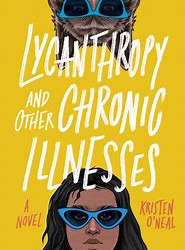
I would 100% recommend reading this book, if you are able, in print format instead of audio. There are a number of sections where the main characters are talking over text chat and I'm not sure how well that would translate over audio.
This book had me saying, "They're just like me fr" non ironically multiple times. It's such a lovely look at friendship and building our own communities and struggling with chronic illness. There is at no point any gatekeeping of what a chronic illness should look like or what a person with a chronic illness needs to look like.
The one thing that I didn't love was the fact that a white author picked first person POV of a POC. It isn't the best choice. I feel better about it after looking through O'Neal's website where she has readily admitted that it was a choice she would not make again. I appreciate the thoughtfulness of not making the "monstrous" character a POC.
Overall! I really enjoyed this book. It's a pretty fast read, but it is heartwarming and hopeful and full of genuine joy.
A Magic Steeped In Poison, by Judy I. Lin
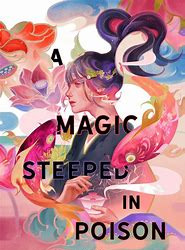
This book was SO fun! Magic, romance, court politics, betrayal. What more could you want? Other than the magic system being tea based. That's right babies, TEA BASED! Monch monch monch, what a beautiful system I am in love.
This is another fast read. I've always been a sucker for magical tournaments and historical fantasy. If any of that is your vibe I would absolutely recommend picking this up. I know there is a second book, but I haven't had the opportunity to read that one yet.
Found, by Margaret Peterson Haddox

Now... Like I said... I was picking books for a reading challenge I'm doing. This one was from "read a middle grade book you never read", so I am FULLY aware that I am not the audience for this book.
That being said, oh my god, this was a rough one. I think my biggest gripe is that the cast are all 13-15 year olds but you would never know it. They're out here acting like 20 year olds. Maybe when I was 13 I would have been able to buy it, but at 30-whatever I am not. This is the first of multiple books and I can't say I regret not reading more.
Vincent and Theo: The Van Gogh Brothers, by Deborah Heiligman
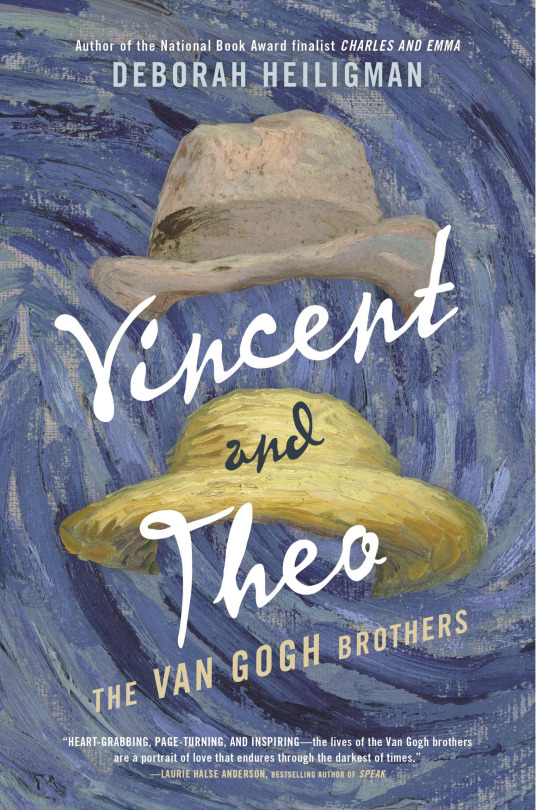
So, I'll be honest, the reason I was drawn to this was because I got to see this amazing Van Gogh art instillation last year. Part of that instillation was a display of excerpts of the letters between Vincent and Theo, and let me tell you, that is what made me cry.
This book is certainly nothing ground-breaking. It's a biography of these two men. It tells their stories at the same time, side by side. I also cried reading this.
Am I emotional? Is it because I have younger siblings I'm very close to? Is it because I, too, am mentally ill and an artist?
Who knows, gamers.
Quackery - A Brief History of the Worst Ways to Cure Everything, By Nate Pedersen & Lydia Kang, MD
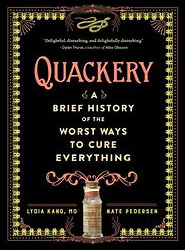
Again, nothing groundbreaking. This book is a funny and informative look at medical process through history. I'm a sucker for medical history. I did listen to the audiobook for this and I think it really helped the humor shine. If you're also a fan of bizarre medical history (or the podcast Sawbones), this is the book for you.
The Devil in the White City, by Erik Larson
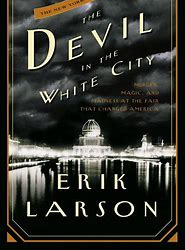
I enjoyed this book! For a person who is bad at remembering names, though, it was difficult to follow at times. There were so many players in the conception and realization of the Chicago World's Fair that I would lose track of just who I was hearing about.
That said, it was a very cool look into the trials and tribulations that went into making the spectacle a reality. This book managed to touch on SO much, not even to it's detriment. Despite getting confused by names the main through-line was easy to follow. I was invested start to finish.
In the Vanishers' Palace, by Aliette de Bodard
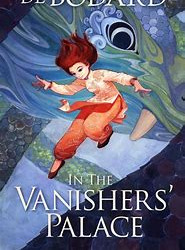
Do you like beauty and the beast retellings, but instead the beast is a very cool dragon, and also it's hella gay??? Then do I have the book for you! It does one of my favorite sci-fi things where there is a world, there are facts of that world, but you aren't supposed to learn them. Those aren't what matter, they are simply table setting. It's a beautiful story. I do wish there was a bit more depth into the romance, but that's just me.
Beautiful, atmospheric, and emotional. Lovely book.
A Marvelous Light, by Freya Marske

Damn, the pining in this book??? Truly a wonder.
This book is such a lovely blend of interesting plot, intriguing magic system, and just lovely gay romance. I've been trying to consciously read more queer books this year and so far I am having a wonderful time. I'm going to be 32 this year and for the first time since I was a pre-teen I'm seeing myself really reflected in books. It's such a fuckin' cool experience. I'm an emotionally compromised teenaged girl.
#lycanthropy and other chronic illnesses#a marvelous light#in the vanasher's palace#devil in the white city#quackery#vincent and theo#van gough#a magic steeped in poision#lgbtqia books#queer books#books and reading
2 notes
·
View notes
Text
(6/10)
Part 4: the real-world relationship
Content warning: discussions of violence/abuse/suicide.
[List of all parts]
[Part 3.3]
(Note: throughout this section, the fictional characters are referred to as Arthur and Paul, their IRL counterparts as Rimbaud and Verlaine to prevent confusion.)
Initially, I intended for this part to come after the Stormbringer section, but seeing as it was relevant far before that novel came out and it’s also perfectly tied to the previous section, I believe it rightfully belongs here.
With that said, please keep in mind that I am absolutely no historian and I most certainly have no clue about many aspects of the pair’s life even after lengthy diving into this topic, this is only what I personally have come to know of over time. If this is something that interests you too, I would suggest you try to do your own research on it as I didn’t include basically 99% of all that could truly be spoken about here for the sake of consistency and relevancy, given this is not meant to be an essay about the two poets and their entire life. Take this as simply another kind of summary that will not be telling the full story, only what I need to show for context about what we’re actually speaking of.
I believe that, as I stated previously, a lot of people have heard of the real-life Rimbaud and Verlaine’s four-year long relationship, but this is all they really knew. Nearly anyone in the BSD fandom interested in Arthur and Paul’s tale could tell me this, yet only a small portion of those very same people were able to say what the true nature of this relationship was. In reality, while that statement about the pair might sound entirely normal to you, let’s not forget that their time together was far from perfect and even far from healthy. I didn’t even need to read any kind of academic research papers to conclude that it most certainly wasn’t something to glorify, as I have seen some actually do— from their troubling ten year age gap, with Rimbaud being only sixteen and Verlaine twenty seven years old at the time of it all beginning, to the many disagreements and fights in their relationship escalating into physical altercations, or even the impacts it had on people around them, I‘m very positive you could always find a reason to explain why this shouldn’t be condoned, sensationalized nor romanticized. Need I remind people how it ended? With Verlaine shooting Rimbaud? Not only that, but do I also need to bring up that these were real human beings, not fictional characters? It seems to me that people tend to forget this aspect— yes, they most certainly did not live in our day and age where the discussion surrounding all kinds of morals and values in every part of life has changed drastically, and it is true they have been dead for over two centuries, but that is absolutely no excuse to treat it as though it’s a completely normal thing which was occurring everywhere at all times and wasn’t just as devastating as it is considered today. I could name a lot of different historical events which nobody would even dare to treat lightly, and I’m also sure many others involve only two people such as this one, yet not a single soul would be able to tell me anything about “different times”, as we can clearly understand it was still deeply wrong. The reason we have moved on, at least somewhat, was not due to “time passing” and waiting silently for things to change, but rather thanks to people who have always understood the cruel and despicable ways others would think or act without consequence voicing their thoughts, evidently having existed even when it was supposedly “unheard of”, as some would want to claim.
While it would be somewhat sufficient of me to leave it at that and go no further, as I firmly believe there is nothing for me to have to specify beyond stating the rather questionable grounds for the affair and saying it was an abusive one, both verbally and physically, there is something that deeply troubles me, and to explain that, I will have to go into some more depth.
Now, many people, both those in the BSD fandom and those who have never heard of it may know a certain depiction of this story, should they know more than one or two widespread facts about it, and due to me writing this with an intended audience of BSD fans, I will use the poets’ fictional namesakes for comparison. In this depiction, which usually focuses far more on Rimbaud than Verlaine, Rimbaud himself is absolutely nothing like his fictional counterpart and the only thing the pair share is the ending of their respective partnerships, perhaps a dislike of the cold mentioned in Rimbaud's poetry which was most likely grounds for a very notable part of the fictional character's self. As for their personalities, those are completely distinct, at least according to certain people and sources— while Arthur is written to be rather calm, reserved and shy at his core, his real-world inspiration is said to have been anything but that. In fact, many times, one can see him described as nothing but a rude, audacious, sometimes even cruel teen, and this is only if the person describing him is being particularly generous instead of outright derogatory. Once the story is focused on him instead of Verlaine, every so often, one could almost start believing his supposed transgressions were far more significant and destructive than his partner's, and if not that, then they could be equally bad and no part of his life should be taken to with care in any way.
In reality, however, Rimbaud's tale is that of a sixteen-year-old who had escaped an abusive household in pursuit of a path in poetry under the wing of Paul Verlaine, a man whose age at this time I have mentioned before. Said man, despite having had a wife during all this, had taken quite a liking to him, one that could definitely not be described as mere friendship or admiration with the rather uncensored way he spoke of their first meeting, and thus they slowly began an unofficial affair together. While it started off rather well and happily for them, as opposed to the relationship between Verlaine and his wife Mathilde that was slowly being run into the ground by the older man's actions, it hadn't lasted that way forever— due to Verlaine abandoning Mathilde to spend time with Rimbaud, often taking his underage partner out and allowing him to join him in his drinking habits, arguments and physical altercations broke out between him and Mathilde, during which significant amounts of blame had been placed on Rimbaud himself as if the doings of the only actual adult in those interactions were somehow his fault or influence. As Verlaine did not wish to let go of either of the two regardless of how much suffering both his indecisiveness and aggression had caused everyone in the process, a long four years had started to become filled with betrayals, abandonment, deception and all kinds of abuse towards both his close associates, yet out of the two, it was Rimbaud himself with nowhere to go and nothing he could do, should his only source of support disappear from his life one day to follow a life he swore multiple times he would leave behind. To skip lengthy descriptions of all such instances on their travels together, which I do heavily recommend for people to look into for themselves to understand the true nature of this relationship much closer than I'm summarizing it here, despite Rimbaud constantly forgiving his partner for all his wrongdoings and hoping he'd stay true to his repetitive empty promises every time, there was one final occurrence in which he'd finally had enough and wished to leave— that one, however, ended with a drunk Verlaine shooting him, not wishing to let him end the relationship. While there is far more to that event than meets the eye, such as Rimbaud initially not having intended to pursue any kind of action against his partner until a later day in which he feared he'd be shot once more, had he not done so, that of which he additionally wanted to retract as well, one thing I've hopefully made clear— in no way, shape or form should this story be interpreted as these two being “just as bad as each other”, with all their altercations being products of equal blame. A teenage boy with a past I have not even began mentioning here, entirely dependent on a partner with not only a terrible influence on him is, without question, a victim in this situation, and whatever rude, disgraceful or disrespectful actions of his are in no universe comparable to the actions of an adult enabling his self-destructive behavior, abusing him mentally and physically and abandoning him multiple times.
Should one be questioning the significance of this, allow me to explain— a lot of this information is not outright hidden, yet it is not something many wish to hear about, thus it is rarely mentioned even to the small extent I did, and finding it is harder than finding places which will only tell you of the former depictions. Without it, it could potentially lower the perceived level of seriousness one is speaking of when bringing up these topics, feeling as though the talk is truly about two people who have both lived lives just as controversial as their highly dramatized descriptions available. Perhaps this may sound rather daring to say, but I too would be more comfortable not putting much effort in to make sure to show any amount of care or respect if I knew or fully believed I was speaking of a morally reprehensible person who had not been particularly deserving of anything but consequences for their actions, rather than a victim of horrific and traumatic events, and specifically one whose story today is barely shown for what it was in favor of a version which fits a certain public narrative spread out for the sake of sensationalizing a “provocative homosexual relationship in the 1800’s”, as that naturally sounds a lot more entertaining than what I describe it as, and what it also actually was.
Despite absolutely not trying to justify some particular ways I have seen this topic be treated, I do think there’s an explanation for even the slightest, subconscious insensitivities we all may have engaged in one way or another. I presume a lot of it comes from a bit of disconnect between reality and fiction, one that is especially prevalent in the BSD fandom, as it tends to create such a feeling on certain occasions. Due to us not only seeing the IRL people as much too distant from our lives, not having ever encountered them and having only heard of them in studies or writing, additionally simply viewing their fictional counterparts as nothing but that— fictional, even despite knowing they’re based on real people from the past, we tend to forget the actual impact it had on these figures and anyone else struggling with similar situations to this very day. Take Dazai Osamu, for example, as I have spoken about him and his fanbase many times in the distant past elsewhere already. His suicidal tendencies have been practically made into a light-hearted joke by certain parts of the fandom, despite this character trait being taken from his real-life counterpart, an actual person who truly suffered from these issues. While I could certainly get into a whole different essay about why I find many things surrounding Dazai’s character and the fandom’s portrayal of such serious problems quite disrespectful, I will only stick to saying this much. I don’t believe the people joking about it would actually consider it funny in real life, at least I dearly hope, but there is a slight lack of awareness being created, even if only subconsciously, as we usually can’t feel the impact of our words we think are directed solely at people who don’t exist anymore or have never even existed in the first place, rather than at problems surrounding us at all times.
This is the only actual explanation I can think of which I would wholeheartedly understand, it is something the vast majority of us have fallen victim to without actually intending to and must take care to be mindful of, but there are many occasions I have seen during my time in this fandom where I feel as though a gentle wake-up call would be needed. As this work focuses on Rimlaine, I’ll share some of my experiences with that, but I do think it would be beneficial if other such situations were pointed out by others someday as well.
So far, I only directed my words towards the group of people who use the pair’s real-life counterparts’ lives to explain why they believe the two should have been in a relationship before the events of Fifteen. To a certain extent, there is no harm in believing this as long as it’s not blatantly ignorant of the huge problems in both these cases, I only find issues with it when it’s done only to somehow “justify” the shipping aspect of it, entirely ignoring the truth of the very same relationship people seem to speak of and point to.
There, however, was also a fairly similar proclamation doing its rounds that does differ in a certain way. It was essentially using these very same events to not only speculate about the past in the fictional world, but also to try and change its canonical present. There were a few statements being made that actively desired Rimlaine to be an actual, established romance in BSD even post-Fifteen, solely due to the people they were based upon. You may already find that strange just based on the description I provided earlier, but I find something in particular even stranger— while I don’t believe a lot of people knew about the majority of the things I mentioned, despite them all being one or two searches away, there is something which I think might have been more common knowledge— the event which BSD Paul’s betrayal was based off of.
Now, truth be told, there is a group of folks whom I believe genuinely don’t know this transpired. In fact, I have seen a few posts online expressing surprise upon finding this out. I place no real blame onto this group, should they be new to BSD and discussions like these, and I truly hope someone like that could potentially be reading this, just to gain some new information they might not have known before and an incentive to look into these matters further. If they have shared this opinion without any knowledge of these events and they would have thought of it all a bit differently, had they actually found out about them, I see it as nothing other than an honest mistake.
That being said, this is also the second most talked about fact regarding the two poets, with the first one simply confirming their affair together. As many things overlap in this essay, so do some people wishing for Rimlaine’s canonical romance and those who actually know about this information. Perhaps this is only something I don’t understand personally and others wouldn’t even bat an eye at the idea of, but I find it quite interesting and even disturbing to know that there are some who seem to have no issues stating that a fictional relationship— a fully sugarcoated one, at that— should be made canonical even after a set of implied tragic events due to its supposed reflection in reality, despite knowing very well that this reflection spoken of ended in an actual shooting. You don’t even have to include any more details, it should already be quite troubling to know this fact alone and inviting to search for context, yet I have seen it be treated exactly the same way one would treat a completely fictional story, which it was not. There is a very different weight placed upon the two which I have explained prior, even though it should be obvious that an actual event, regardless if it was yesterday or two hundred years ago, should be treated with far more seriousness and care than a story which never happened. This extends to creating any kind of media about that very event, regardless of if it’s on a professional scale as BSD or simply some work of fanfiction, art, anything you could think of— you’re fully allowed to do so, and this comes from a person who has done the same, but you should also stop to consider just how you’re speaking of everything in it. Even though it might not feel like it to many people, these were also human beings just like anyone else, and these events had real, devastating impact on their lives.
Now, this brings me to a point I will also be returning to after Stormbringer, one I needed to establish at the beginning, as I’ve already been slowly getting to it over the course of this whole part. Do you recall how I mentioned the concept of fiction shaping reality to an extent with what we see, tolerate and condone? This is very important here already. It might look a bit complicated when looking at the particular example of BSD and the fandom surrounding it, where fiction is heavily mingled with aspects of reality, but it’s actually quite simple at its core. To me, parts such as Arthur and Paul’s relationship or Dazai’s behavior I mentioned in this media should absolutely be treated with caution and care as the characters and experiences are based on true, painful events real people went through, but this would not change even if they were entirely fictional. Why? Because either way, they’d still be serving as a reflection of very common problems in the world surrounding us, as unfortunate as it is. Even if the real Dazai Osamu did not exist and his namesake was fully fictional, the issue of people having suicidal tendencies would persist, and those would be the target of all jokes or lack of seriousness about it, not the character himself. In that same vein, even if BSD Arthur and Paul were entirely made up for a story from scratch, what we end up learning about the two over the course of both novels also reflect on very real behaviors and problems some have to deal with on a daily basis, which I will return to in Stormbringer’s part once I explain them fully. By people taking such “fictional” topics not only extremely lightly, but with a concerning amount of lightness and humor at times, it might become impossible to distinguish what you truly believe in terms of those exact same problems being presented to you in real life, and not only to yourself— to those around you as well, and perhaps even mainly.
With that aside, I think I should make one more thing clear, although I hope it goes without saying. While I did state a few past real-life events and explained why they should not be treated as carelessly as many people take them for, you may have noticed I didn’t refer back to those in the section above when mentioning Arthur and Paul’s BSD counterparts. This is due to a simple reason— the fictional characters of Arthur and Paul did receive a full story after Fifteen and it no longer allowed room to speculate as much as before. The stories and events shared much less glaring similarities after that point onward to people who haven’t thoroughly researched their counterparts, save for Arthur actually being confirmed to have been shot, just as occurred in real life. I do, however, believe this section was still very important to cover in its entirety as the things it speaks of still get brought up every day in the same fashion they were spoken of all those years ago, regardless of how similar it now is on the very surface to BSD’s storyline, and it serves as a reference as to what truly stands as heavy inspiration behind the ship I am covering.
Now, since I’m speaking about events which already trace back to Stormbringer, it’s finally time for me to cover that novel itself.
[Part 5]
#text post#bungou stray dogs#bsd#bsd fifteen#bsd stormbringer#bsd storm bringer#bsd arthur rimbaud#bsd paul verlaine#rimlaine#asachuu
0 notes
Text
You’re (Probably) Drawing Archers Wrong
Hello, my name is Len and I’ve shot archery as a hobby for as long as I can remember. I have a problem: fanart depicting archery is oftentimes Very Wrong! I feel like most of this stems from not using good reference pictures, and from a general lack of knowledge. So, I wanted to create a post for anyone interested in accurately drawing an archer! Disclaimer: this is not a comprehensive post or a tutorial on how to shoot, and is intended for artists. That said, if you’re interested in archery, you may still find value in this post, though I recommend doing your own research. I’m certain there will be errors here considering I do this as a hobby not a profession, and I welcome corrections. Finally, archery can be dangerous, and even if you don’t read any more of this post, PLEASE read the safety section.
Safety
This part is going to be a PSA, because the thought of someone reading my post, getting into archery themselves, and doing these things? It terrifies me. So, rules number one, two, and three are: never aim at another person (duh), never use a damaged bow or arrows, and never, NEVER dry fire a bow. Dry firing means drawing back and releasing the string without an arrow. This can make your bow EXPLODE. It can hurt you, and even if your bow doesn’t explode, it’s fucked it up so bad that you should never shoot that bow again. Don’t do it, and don’t draw art of people doing it. Okay, PSA done, now onto the rest of the post.
There’s a TL;DR at the bottom!
First thing’s fist: the equipment! Archery requires four things: a bow, a quiver, arrows, and protective equipment (which is usually what I see most posts lacking). The first thing you should do before you draw your archer is decide what type of bow to give them. I’m not covering crossbows because I’ve only shot one once and I also Hate Them. There are three main types of bows: longbows, recurves, and compounds.
Bows

There are two different types of bows that are commonly called a longbow: English longbows, and flatbows (yes I’m considering flatbows a type of longbow to simplify things). English longbows are very large and have a very high draw weight (which means it’s hard to pull the sting back). These were used mainly by the English in the Middle Ages. Flatbows are typically smaller and have a lower draw weight as well as a slightly different profile. These were mainly used by Native American tribes such as the Hupa, the Karuk, and the Wampanoag, as well as prehistoric Europeans and the Finnish, among others. It is often seen in historical fiction and fantasy, and the English longbow is usually depicted as Robin Hood’s preferred bow type. I believe Katniss uses a flatbow in the beginning of Hunger Games, but don’t quote me on that.
Recurves have limbs that curve outwards and are smaller than longbows. Many, many cultures have used these, including but not limited to certain West-coast Native American tribes, the Mongols, the Scythians, the Greeks, the Turks, the Koreans, and the Chinese. Recurves can be made of either wood or of a combination of wood, horn, and glue, making them either composite or non-composite. These are the bows you typically see mounted archers using, and are often used in competitions today. It’s commonly seen in fantasy, and is the bow type used by Legolas, Tauriel, Katniss Everdeen in Mockingjay, Merida, Green Arrow has a lever action, and Hawkeye uses a silly collapsible one.
Compound bows are the most commonly used bow among hunters, are almost always made of fiberglass and either carbon fiber or aluminum, are Technical Looking, and pack the biggest punch for the least amount of effort. It’s a modern invention used worldwide. I don’t know where else to put this, but almost everyone who I know that shoots a compound uses something called a trigger release (pictured below) to draw back the string because it means your release is cleaner.

So, those are the main types of bow! Google which bow would be appropriat for the era and region your character is from, or if they’re from space or an alternate dimension, pick whichever you think fits the character the best.
Quivers
There are two types of quiver: back quivers, like Legolas wears, and hip quivers, like those used in the Olympics. Which quiver you should use varies from culture to culture and time period to time period. If it’s fantasy, set in modern day, or set in the future, you can chose whichever you prefer.
Arrows
Arrows can have shafts of wood or fiberglass, can have real feathers or synthetic for fletching, and can have countless different types of heads. The main two that are in use today are called field points and broadheads, and most commercial arrow shafts allow you to freely switch them out.
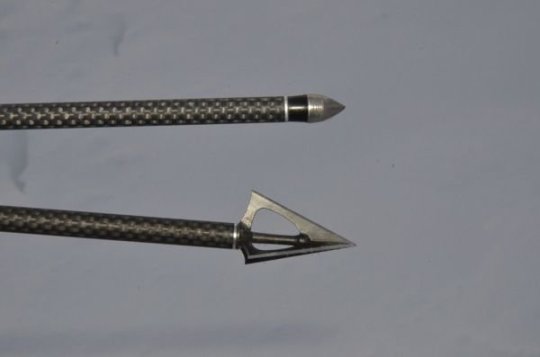
The arrow on the top is a field point, used only for target practice, and the arrow on the bottom is a broadhead, used only for hunting or war. You never hunt with a field point, and never practice with a broadhead. Basically every fictional character out there is shooting to kill, so they’ll all use either a broadhead, or a culturally appropriate variation of deadly arrowhead (bodkin, scythian, flint, etc). Do your research! A Native American wouldn’t use a bodkin, and a Scythian wouldn’t use a flint arrowhead!
Protective Equipment
The one really necessary piece of protective equipment is hand protection. If your character uses a three fingered draw or a pinch draw (we’ll speak on draws later), they need either an archery tab, or an archery glove. If your character is using a thumb draw, they need a thumb ring. These three pieces of equipment keep archers from getting blisters and damaged skin.

This is a tab.

This is the type of glove that I use. All an archery glove needs to do is protect your three draw fingers, but it can be more traditionally glove-like than this one. I’ve even seen ones that are a combination leather bracer and archery glove that give big Fantasy Vibes.
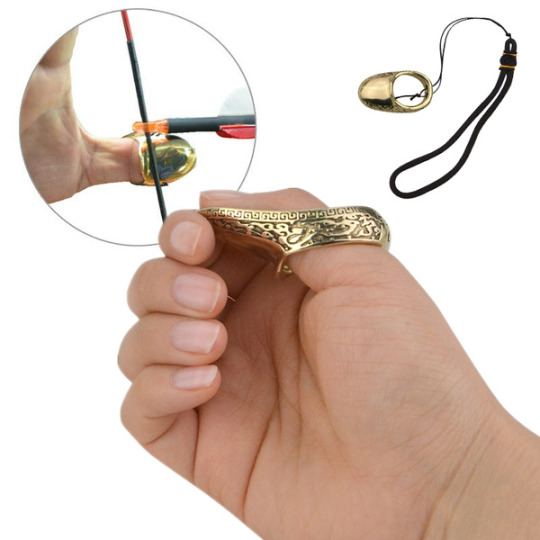
This is a ring. Some historical ones can get REAL ornate and pretty.
Another piece of protective equipment that is commonly used is an arm guard or a bracer. Not everyone uses one, because if your form is good the string should not be hitting your arm, so you can get away with not giving your character one. They can vary in style from something like the more minimal one below up to a full leather bracer.

Form
Form can vary greatly and I’m not about to diss other archery disciplines especially ones I’m ignorant on, so just know that not every culture has the same form. I’m just going to cover a few cultures’ variations, and what I’ve been taught by 21st century Midwest archers. There are several aspects to form, as form is just another term for “everything pertaining to how you shoot”. I’m going to break it down into stance, posture, draw, elbow discipline, holding the bow, and anchor. These are not the only aspects of form (there’s aiming, release, and breath control), but these are the only relevant aspects to drawing archers. I will not be covering mounted archery because I’m sadly ignorant on the topic. I recommend doing your own research and looking into Mongolian mounted archery.
Stance
The thing all stances have in common is that you should put your feet a shoulder-length apart, balance your weight equally between both feet, keep your knees slightly bent, and stand facing approximately 90 degrees away from your target. There are three stances that are common that I’m aware of: squared, open, and closed.

Squared stance means keeping both feet squared up to an imaginary line. Open means that you’re facing slightly towards the target. Closed means you’re facing slightly away. I vary between square and open, and to be honest I’ve never noticed a difference. So long as you draw your character standing with a stable stance, facing away from the target, you should be good.
Posture
Your posture should be with your back straight, your hips squared, and should never have you leaning. Below is one of my favorite archery pictures, not only because I love Marilyn, but because it is a great illustration of what not to do posture wise.
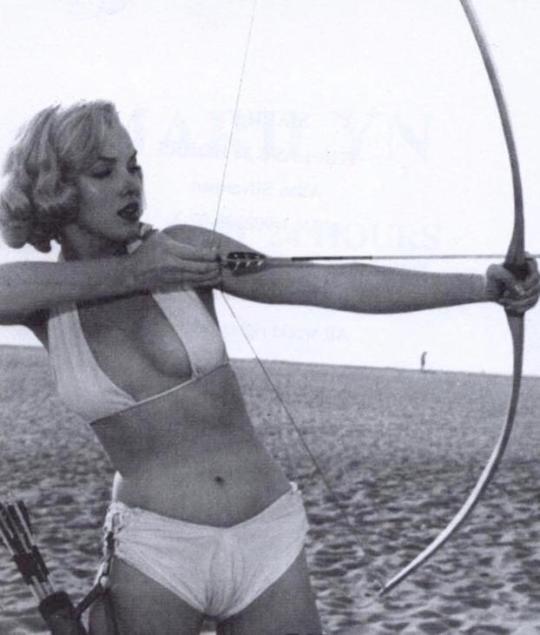
See how she’s leaning back? Yeah, don’t draw your character like that, it looks foolish.
Draw
There are four different types of draw that I’m aware of, I’m educated on three, and I have experience with one (though I’m itching to learn to thumb draw). The types of draw are three fingered draw, otherwise known as Mediterranean draw, pinch draw, thumb draw aka Mongolian draw, and Japanese draw, or torikake. I know fuck all about Japanese draws, so I’m not going to speak out of my ass on topics I don’t understand (if anyone reading practices traditional Japanese archery I would love if you chimed in!). I highly recommend doing your own research on which civilization your character comes from and which draw they use, especially if it’s Japanese because I’m not covering that here.

First up is three-fingered. This is the draw I use, and it’s the most common draw in my limited experience in the Midwestern archery community. It is common in Europe and the Middle East. It requires you to use three fingers, partially wrapped around the string. You do not pinch the arrow. Most people place their index finger above the arrow and their middle and ring finger below, though I’ve seen all different variations. If your character is right handed and uses this draw, draw the arrow on the left side of the bow. Lefties do the inverse, and make sure and draw a left handed bow while you’re at it.
Next is the pinch draw. I’ve never shot with this, nor seen it used. It was common in the Americas and for a time in Ancient Greece. You’re supposed to physically pinch the arrow between your thumb and index finger. Your character would need a full archery glove if you draw them with this grip. The release is supposed to be smooth because there’s only one point of contact, rather than three. I believe you would place the arrow on the right side of the bow when using this technique, but I cannot speak with certainty as I’ve never seen it done (again, lefties would do the opposite).
Last but not least is the thumb or Mongolian draw, though it is/was also widespread in Korea, China, Russia, Persia, Turkey, and the Roman and Byzantine Empires. In this draw you wrap your thumb completely around the string and tuck it behind your other fingers. You do not grab the arrow. This draw utilizes your strongest digit, and so it may be less strenuous than other draws. This draw is commonly used with mounted archery. If your character is right handed and using this draw, put the arrow on the right side of the bow (lefties, do the inverse).
Elbows
Another aspect of your draw that is important is elbow discipline. The elbow of your character’s string hand should not point up into the air. It should point straight back, like the picture below.
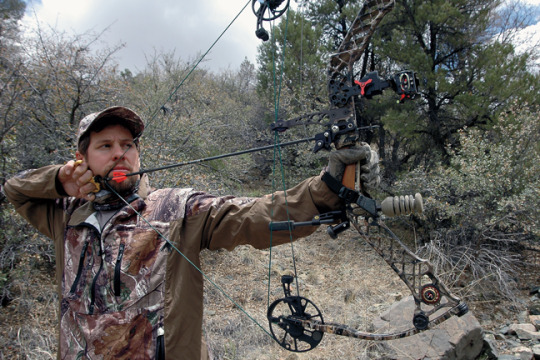
Now, the other elbow is important, too. Don’t draw them with a locked elbow, instead keep it slightly bent and rotated inwards, like the picture below.

Holding the Bow
Your character shouldn’t have a death grip on the bow. Instead, show it resting in the curve between the thumb and index finger. Here’s a wikihow article that describes the different ways to hold different types of bows that is more succinct than I could ever be. Ignore the crossbow (derogatory).
Anchor
Everyone needs an anchor. What’s an anchor, you ask? An anchor is a fixed spot that you draw your string back to whenever you’re going to shoot. It’s necessary in order to ensure consistency, which is accuracy’s best friend. Your anchor spot can vary. I anchor at the corner of my lip. Some people anchor underneath their chin. Some anchor to their ear. I’ve even seen some people in Asian disciplines anchor behind the ear or almost above the head, which is incredibly impressive. Bottom line, unless your character’s archery discipline has them draw behind the ear or above the head, you need to have them touching their head somewhere. The only wrong anchor is a short anchor. If you can’t draw the string back far enough to touch your face, that means you’re either trying to draw back a bow with too high a poundage, or the draw length is too short for you. The picture above of the person with the compound trigger release has a good anchor point on their face. The picture of the person with the arm guard has a good anchor point under their chin.
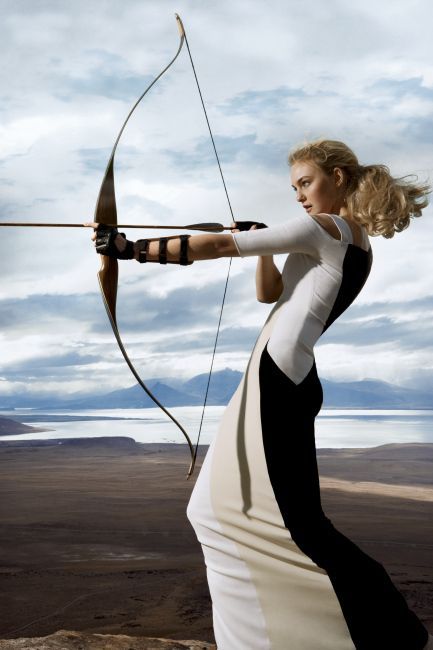
This person, on the other hand? Their anchor is out in space, that is to say they don’t have one (also their elbow discipline, posture, and stance are atrocious). I see this in fanart ALL THE TIME. It’s a pet peeve of mine. Don’t do this, have them anchor to their head or behind it somewhere.
Carrying The Bow
The best way is to just carry it in your hand by the bow (not the string). You can give your character a bow sling, or a back mount like Legolas has as well. You can slip the string over your shoulder and wear it across your back in a pinch, though this may damage the string. The only really wrong way to carry a bow is by the string, though you can damage your bow carrying it on your back if you’re stupid, and I’ve never tried to do so with a compound. Too pokey.
TL;DR
If you’re drawing a fantasy character, go buck wild. Still make sure to give them the right type of arrowhead, hand protection of some sort, a strong stance (no kneeling or sitting), good posture, a sensible draw, elbow discipline, an anchor point (don’t be like the person above!), and a good way to carry their bow, but you can have fun with the rest. If you’re drawing a character from history, research the archery discipline they would most likely use, and draw them with the appropriate bow type, quiver, arrows, protective equipment, stance, posture, draw, elbow discipline, anchor, and bow carry.
#archery#legolas#legolas greenleaf#lotr#tauriel#katniss everdeen#merida#green arrow#hawkeye#clint barton#robin hood#archer#bows#art reference#len speaks#holy FUCK it's complete!#i spent like five hours researching for this post jfc i'm beat#me: *sees one terrible piece of legolas fanart*#me: *cracks knuckles* tiME TO INFODUMP#anyways in conclusion fuck cr*ssbows uwu
1K notes
·
View notes
Text
How to Write Indigenous Characters Without Looking like a Jackass:
Update as of December 26th, 2020: I have added a couple new sections about naming and legal terms, as well as a bit of reading on the Cherokee Princess phenomenon.
Boozhoo (hello) Fallout fandom! I'm a card-carrying Anishinaabe delivering this rough guide about writing Indigenous characters because wow, do I see a lot of shit.
Let's get something out of the way first: Fallout's portrayal of Indigenous people is racist. From a vague definition of "tribal" to the claims of them being "savage" and "uncivilized" mirror real-world stereotypes used to dehumanize us. Fallout New Vegas' narrated intro has Ron Perlman saying Mr. House "rehabilitated" tribals to create New Vegas' Three Families. You know. Rehabilitate. As if we are animals. Top it off with an erasure of Indigenous people in the American Southwest and no real tribe names, and you've got some pretty shitty representation. The absence of Native American as a race option in the GECK isn't too great, given that two Native characters are marked "Caucasian" despite being brown. Butch Deloria is a pretty well-known example of this effect. (Addendum: Indigenous people can have any mix of dominant and recessive traits, as well as present different phenotypes. What bothers me is it doesn't accommodate us or mixed people, which is another post entirely.)
As a precautionary warning: this post and the sources linked will discuss racism and genocide. There will also be discussion of multiple kinds of abuse.
Now, your best approach will be to pick a nation or tribe and research them. However, what follows will be general references.
Terms that may come up in your research include Aboriginal/Native Canadian, American Indian/Native American, Inuit, Métis, and Mestizo. The latter two refer to cultural groups created after the discovery of the so-called New World. (Addendum made September 5th, 2020: Mestizo has negative connotations and originally meant "half breed" so stick with referring to your mixed Latine and Indigenous characters as mixed Indigenous or simply by the name of their people [Maya, Nahua].)
As a note, not every mixed person is Métis or Mestizo. If you are, say, Serbian and Anishinaabe, you would be mixed, but not Métis (the big M is important here, as it refers to a specific culture). Even the most liberal definition caps off at French and British ancestry alongside Indigenous (some say Scottish and English). Mestizo works the same, since it refers to descendants of Spanish conquistadors/settlers and Indigenous people.
Trouble figuring out whose land is where? No problem, check out this map.
Drawing
Don't draw us with red skin. It's offensive and stereotypical.
Tutorial for Native Skintones
Tutorial for Mixed Native Skintones
Why Many Natives Have Long Hair (this would technically fit better under another category, but give your Native men long hair!)
If You're Including Traditional Wear, Research! It's Out There
Languages
Remember, there are a variety of languages spoken by Indigenous people today. No two tribes will speak the same language, though there are some that are close and may have loan words from each other (Cree and Anishinaabemowin come to mind). Make sure your Diné (you may know them as Navajo) character doesn't start dropping Cree words.
Here's a Site With a Map and Voice Clips
Here's an Extensive List of Amerindian Languages
Keep in mind there are some sounds that have no direct English equivalents. But while we're at it, remember a lot of us speak English, French, Spanish, or Portuguese. The languages of the countries that colonized us.
Words in Amerindian languages tend to be longer than English ones and are in the format of prefix + verb + suffix to get concepts across. Gaawiin miskwaasinoon is a complete sentence in Anishinaabemowin, for example (it is not red).
Names
Surprisingly, we don't have names like Passing Dawn or Two-Bears-High-Fiving in real life. A lot of us have, for lack of better phrasing, white people names. We may have family traditions of passing a name down from generation to generation (I am the fourth person in my maternal line to have my middle name), but not everyone is going to do that. If you do opt for a name from a specific tribe, make sure you haven't chosen a last name from another tribe.
Baby name sites aren't reliable, because most of the names on there will be made up by people who aren't Indigenous. That site does list some notable exceptions and debunks misconceptions.
Here's a list of last names from the American census.
Indian Names
You may also hear "spirit names" because that's what they are for. You know the sort of mystical nature-related name getting slapped on an Indigenous character? Let's dive into that for a moment.
The concept of a spirit name seems to have gotten mistranslated at some point in time. It is the name Creator calls you throughout all your time both here and in the spirit world. These names are given (note the word usage) to you in a ceremony performed by an elder. This is not done lightly.
A lot of imitations of this end up sounding strange because they don't follow traditional guidelines. (I realize this has spread out of the original circle, but Fallout fans may recall other characters in Honest Hearts and mods that do this. They have really weird and racist results.)
If you're not Indigenous: don't try this. You will be wrong.
Legal Terms
Now, sometimes the legal term (or terms) for a tribe may not be what they refer to themselves as. A really great example of this would be the Oceti Sakowin and "Sioux". How did that happen, you might be wondering. Smoky Mountain News has an article about this word and others, including the history of these terms.
For the most accurate information, you are best off having your character refer to themselves by the name their nation uses outside of legislation. A band name would be pretty good for this (Oglala Lakota, for example). I personally refer to myself by my band.
Cowboys
And something the Fallout New Vegas fans might be interested in, cowboys! Here's a link to a post with several books about Black and Indigenous cowboys in the Wild West.
Representation: Stereotypes and Critical Thought
Now, you'll need to think critically about why you want to write your Indigenous character a certain way. Here is a comprehensive post about stereotypes versus nuance.
Familiarize yourself with tropes. The Magical Indian is a pretty prominent one, with lots of shaman-type characters in movies and television shows. This post touches on its sister tropes (The Magical Asian and The Magical Negro), but is primarily about the latter.
Say you want to write an Indigenous woman. Awesome! Characters I love to see. Just make sure you're aware of the stereotypes surrounding her and other Women of Color.
Word to the wise: do not make your Indigenous character an alcoholic. "What, so they can't even drink?" You might be asking. That is not what I'm saying. There is a pervasive stereotype about Drunk Indians, painting a reaction to trauma as an inherent genetic failing, as stated in this piece about Indigenous social worker Jessica Elm's research. The same goes for drugs. Ellen Deloria is an example of this stereotype.
Familiarize yourself with and avoid the Noble Savage trope. This was used to dehumanize us and paint us as "childlike" for the sake of a plot device. It unfortunately persists today.
Casinos are one of the few ways for tribes to make money so they can build homes and maintain roads. However, some are planning on diversifying into other business ventures.
There's a stereotype where we all live off government handouts. Buddy, some of these long-term boil water advisories have been in place for over twenty years. The funding allocated to us as a percentage is 0.39%: less than half a percent to fight the coronavirus. They don't give us money.
"But what about people claiming to be descended from a Cherokee princess?" Cherokee don't and never had anything resembling princesses. White southerners made that up prior to the Civil War. As the article mentions, they fancied themselves "defending their lands as the Indians did".
Also, don't make your Indigenous character a cannibal. Cannibalism is a serious taboo in a lot of our cultures, particularly northern ones.
Our lands are not cursed. We don't have a litany of curses to cast on white people in found footage films. Seriously. We have better things to be doing. Why on earth would our ancestors be haunting you when they could be with their families? Very egotistical assumption.
Indigenous Ties and Blood Quantum
Blood quantum is a colonial system that was initially designed to "breed out the Indian" in people. To dilute our bloodlines until we assimilated properly into white society. NPR has an article on it here.
However, this isn't how a vast majority of us define our identities. What makes us Indigenous is our connections (or reconnection) to our families, tribes, bands, clans, and communities.
Blood quantum has also historically been used to exclude Black Natives from tribal enrollment, given that it was first based on appearance. So, if you looked Black and not the image of "Indian" the white census taker had in his brain, you were excluded and so were your descendants.
Here are two tumblrs that talk about Black Indigenous issues and their perspectives. They also talk about Aboriginal and Torres Strait Islander people of Australia.
However, if you aren't Indigenous, don't bring up blood quantum. Don't. This is an issue you should not be speaking about.
Cherokee Princess Myth
"Princess" was not a real position in any tribe. The European idea of monarchy did not suddenly manifest somewhere else. The closest probable approximation may have been the daughter of a chief or other politically prominent person. But princess? No.
Here is an article talking about possible origins of this myth. Several things are of note here: women from other tribes may have bee shoved under this label and the idea of a "Cherokee Princess" had been brought up to explain the sudden appearance of a brown-skinned (read: half Black) family member.
For a somewhat more in depth discussion of why, specifically, this myth gets touted around so often, Timeline has this piece.
Religion
Our religions are closed. We are not going to tell you how we worship. Mostly because every little bit we choose to share gets appropriated. Smudging is the most recent example. If you aren't Indigenous, that's smoke cleansing. Smudging is done in a specific way with ceremonies and prayers.
Now, a lot of us were forcibly converted. Every residential school was run by Christians. So plenty of us are Catholic, Baptist, Anglican, Lutheran, etc. Catholicism in Latin America also has influence from the Indigenous religions in that region.
Having your Indigenous character pray or carry rosaries wouldn't be a bad thing, if that religion was important to them. Even if they are atheist, if they lived outside of a reserve or other Indigenous communities, they might have Christian influences due to its domination of the Western world.
Settler Colonialism and the White Savior Trope
Now we've come to our most painful section yet. Fallout unintentionally has an excellent agent of settler-colonialism, in particular the Western Christian European variety, in Caesar's Legion and Joshua Graham.
(Addendum: Honest Hearts is extremely offensive in its portrayal of Indigenous people, and egregiously shows a white man needing to "civilize" tribals and having to teach them basic skills. These skills include cooking, finding safe water, and defending themselves from other tribes.)
Before we dive in, here is a post explaining the concept of cultural Christianity, if you are unfamiliar with it.
We also need to familiarize ourselves with The White Man's Burden. While the poem was written regarding the American-Philippine war, it still captures the attitudes toward Indigenous folks all over the world at the time.
As this article in Teen Vogue points out, white people like to believe they need to save People of Color. You don't need to. People of Color can save themselves.
Now, cultural Christianity isn't alone on this side of the pond. Writer Teju Cole authored a piece on the White Savior Industrial Complex to describe mission trips undertaken by white missionaries to Africa to feed their egos.
Colonialism has always been about the acquisition of wealth. To share a quote from this paper about the ongoing genocide of Indigenous peoples: "Negatively, [settler colonialism] strives for the dissolution of native societies. Positively, it erects a new colonial society on the expropriated land base—as I put it, settler colonizers come to stay: invasion is a structure not an event. In its positive aspect, elimination is an organizing principal of settler-colonial society rather than a one-off (and superseded) occurrence. The positive outcomes of the logic of elimination can include officially encouraged miscegenation, the breaking-down of native title into alienable individual freeholds, native citizenship, child abduction, religious conversion, resocialization in total institutions such as missions or boarding schools, and a whole range of cognate biocultural assimilations. All these strategies, including frontier homicide, are characteristic of settler colonialism. Some of them are more controversial in genocide studies than others." (Positive, here, is referring to "benefits" for the colonizers. Indigenous people don't consider colonization beneficial.)
An example of a non-benefit, the Church Rock disaster had Diné children playing in radioactive water so the company involved could avoid bad publicity.
Moving on, don't sterilize your Indigenous people. Sterilization, particularly when it is done without consent, has long been used as a tool by the white system to prevent "undesirables" (read, People of Color and disabled people) from having children. Somehow, as of 2018, it wasn't officially considered a crime.
The goal of colonization was to eliminate us entirely. Millions died because of exposure to European diseases. Settlers used to and still do separate our children from us for reasons so small as having a dirty dish in the sink. You read that right, a single dirty dish in your kitchen sink was enough to get your children taken and adopted out to white families. This information was told to me by an Indigenous social work student whose name I will keep anonymous.
It wasn't until recently they made amendments to the Indian Act that wouldn't automatically render Indigenous women non-status if they married someone not Indigenous. It also took much too long for Indigenous families to take priority in child placement over white ones. Canada used to adopt Indigenous out to white American families. The source for that statement is further down, but adoption has been used as a tool to destroy cultures.
I am also begging you to cast aside whatever colonialist systems have told you about us. We are alive. People with a past, not people of the past, which was wonderfully said here by Frank Waln.
Topics to Avoid if You Aren't Indigenous
Child Separation. Just don't. We deserve to remain with our families and our communities. Let us stay together and be happy that way.
Assimilation schools. Do not bring up a tool for cultural genocide that has left lasting trauma in our communities.
W/ndigos. I don't care that they're in Fallout 76. They shouldn't be. Besides, you never get them right anyway.
Sk/nwalkers. Absolutely do not. Diné stories are not your playthings either.
I've already talked about drugs and alcohol. Do your research with compassion and empathy in mind. Indigenous people have a lot of pain and generational trauma. You will need to be extremely careful having your Indigenous characters use drugs and alcohol. If your character can be reduced to their (possible) substance abuse issues, you need to step back and rework it. As mentioned in Jessica Elm's research, remember that it isn't inherent to us.
For our final note: remember that we're complex, autonomous human beings. Don't use our deaths to further the stories of your white characters. Don't reduce us to some childlike thing that needs to be raised and civilized by white characters. We interact with society a little differently than you do, but we interact nonetheless.
Meegwetch (thank you) for reading! Remember to do your research and portray us well, but also back off when you are told by an Indigenous person.
This may be updated in the future, it depends on what information I come across or, if other Indigenous people are so inclined, what is added to this post.
#fallout 3#fallout 4#fallout 76#fallout new vegas#fallout 1#fallout 2#fallout: new vegas#ozhibii'ige
13K notes
·
View notes
Text
Announcement: No Longer Answering Rubber Stamp Questions
Introduction
Here at Writing With Color, we’ve noticed a shift in the questions we are receiving. In the past, the majority of questions challenged the necessity of diversity in fiction or asked for assistance in making diversity seem more plausible in world-building. We also received many questions on how to describe and characterize people of color in respectful ways that didn’t demonize different races, ethnicities and religions.
By and large, we see that our followers understand why these concepts are important, and for that we congratulate you! This kind of progress takes real, long-term, internal work. Our team hopes that any advice or input you received from us over the years has helped you continue to develop as a writer. We hope you will continue to support us in the future and are especially pleased to hear from our non-white commenters who have let us know when our content has let them feel seen or heard.
However…
We have noticed a recent trend in asks that is discouraging. Many askers seem concerned with receiving our blanket approval of a particular concept or character. These asks often don’t provide us with the direction and context crucial to providing advice from a race or ethnicity-based perspective. Examples include:
“I’m writing a character from [insert background] who has [insert traits]. Is this ok?”
“I’m creating a world where I have made [insert concept] the basis of my world-building. Is this allowed?”
Hi, I’m a [insert identity]. Is it problematic to have [concept/ character] in my story?
“I’m creating a [Race A] character with [these] traits, a [Ethnicity 1] character with [those] traits, a [Race B] character with [some other traits] and a [sex/ gender minority] character with a [different set of traits]. Is this combination offensive?
We call these questions rubber stamp questions. If this describes your question, there’s no need to feel bad. We realize that there was never an explicit explanation of this concept. In addition, our team is mindful of the changing demographics of tumblr that might make it mean we are receiving questions from a younger user-base are not yet familiar with many of the principles we outline on this website. However, on that note…
What is Rubber Stamping?
Rubber stamping refers to the practice of seeking an endorsement without questioning or seeking to alter the status quo. The purpose of Writing With Color is to be a focal point for discussion about diversity in writing rather than simply prescribe a series of corrective measures. Without knowing the asker’s intent (Which we can’t, since we aren’t mind readers), our moderators are not in a position to provide you with carte blanche for your writing concept in the name of all other non-white people. Yes, we have a certain level of skill and expertise on many of these topics, but we are not here to take on the burden of all PoC to approve your writing choices. Nor would it be fair to other PoC if you took our response as a reason to dismiss the perspectives of other PoC (An unfortunately common phenomenon).
Bluntly, on the moderator end, these asks are also incredibly frustrating because they are vague and thus:
Time consuming
Labor intensive (mentally and emotionally)
The last example from the previous section (AKA “Laundry lists”) is particularly time consuming because multiple moderators must collaborate to produce an answer that boils down to each moderator saying, “I guess it depends??? *shrug*” but in slightly different ways.
Perhaps the biggest problem with rubber stamp asks is they feel (to us) like they are more about the asker’s desire for closure/ approval/ virtue signaling than a willingness to participate in the kind of education and discussion on diversity we are trying to foster on this blog.
To that effect: We will no longer be answering such questions.
(If you sent in such ask before this goes up on November 15th, 2020, a moderator may reach out to you individually to better address your inquiry as submitted.)
However: Don’t worry! We also are here to teach you how to makes these questions better!
Fixing Rubber Stamp questions:
1. Be specific.
Instead of Can I/ May I, try “How can I” or “When can I” or “What can I”?
Thus instead of: “I’m Christian. May I create a Jewish character seeking to become an actress in 1920s Hollywood?” —> “How do I, as a Christian, create a compelling Jewish character while being mindful of the interplay between my own intrinsic bias and historical accounts of prominent Jewish figures in early Hollywood?”Or, instead of: “I want to write a story about a modern day piracy in the East Indian Ocean, but with magic. Is this problematic? —> “Given the continuation of modern day piracy in the East Indian Ocean, what are some tropes I should avoid if I decide to go with a modern fantasy set in this region?”
2. Remember: The goal is improved understanding, not approval. Sometimes, you really just want to know *why* you can’t use a particular concept, and that curiosity is good! Questions that ask “Why?” in good faith are often how you can learn a lot about your own intrinsic biases and the limits of your own knowledge.
Thus, instead of: If I write about [controversial topic], am I a bad person? —> Why is it better for someone like me to not write about [controversial topic]?
This approach has the bonus effect of making us feel like you actually care about what we think.
3. Write your question as a draft: Edit your ask at least once or twice to provide as much information as possible while being concise. I’ve told this to college students before, but I can tell when a person wrote their assignment by the quality of the writing. Writing done late at night, when sleep deprived and without at least one edit contains extraneous information while not having a clear point.
Going through your question (Preferably a day after you wrote it) will help you narrow down what you really want to know.
Remember: You all have free will and can write whatever you please. We presume that you seek WWC’s input because you wish to write on issues pertaining to people of color with greater levels of awareness. On a practical note, we recognize that social media, trolling, call-outs, doxxing and other dimensions of cyberbullying make writers online hesitant to do anything unless they think they have the majority of the public on their side. There are times when it is obvious that the asker is asking more because they need approval to feel less anxious when they share their work with others.
However, if the above is your worry, either you aren’t ready to write on this topic or you need to rethink the boundaries you set with the online communities/ individuals you interact with as well as how you manage your internet presence. With respect to personal anxieties when it comes to writing, morality, your conscience and so forth, we recommend turning to your own support systems IRL. As relative strangers on the internet, we are not well-qualified to allay personal concerns.
Remember: Writing with diversity is like training for a marathon. Give yourself permission to expand your comfort zone at the pace your research capabilities and experience allow!
We appreciate that you all trust us to provide helpful, well-thought out feedback for your ideas, and we also thank you for respecting our perspectives even if you may disagree. In the same vein, we request that you put the level of thought into your questions you think appropriate given that another human being is going to spend, at a minimum, several hours coming up with their response. We look forward to hearing from you!
- The WWC Team
(A link to this article will be added to the pinned FAQ for everyone’s reference)
1K notes
·
View notes
Text
“What is this, the Dark Ages?”
Or, Arthurian themes and allusions in the Brotherhood of Steel mythos as seen in Fallout 4. (But that’s a lot of words.)
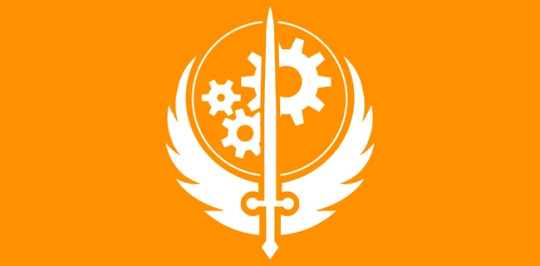
Yep. We're doing this.
First, some obligatory caveats: there is no single Arthurian canon, just 1500 years of assorted fanfic based on the whims of whoever was writing at the time. For this extremely highbrow Tumblr meta, I have ignored most of it and drawn on my favorites. Also Wikipedia.
Also, I am not an expert in Arthurian literature (or Fallout lore, come to that), and I preemptively beg the pardon of anyone who is.
Finally, in no way am I claiming that all these parallels and thematic echoes are deliberate or even significant. In fact, I'd break it down into:
Clearly deliberate allusions, whether in or out of universe;
Probably coincidence, but could be someone deliberately capitalizing on a coincidental similarity;
Almost certainly coincidence, but fun to speculate about; annnnd
Blatant Monty Python references. (Because of course there are.)
I'll start with the big one.
Arthur Maxson, boy king and unifier

(source)
So across all the retellings and variations of King Arthur’s life story, there are a few consistent elements, particularly in his early life and rise to power. Some of these threads are echoed in the Fallout universe, specifically (and unsurprisingly) in the person of Arthur Maxson.
Both the legendary King Arthur and Arthur Maxson were born with a claim to power lying in their ancestry, both were fostered away from their families, and both proved themselves in combat at a young age.
King Arthur united the warring kingdoms of Britain into a single entity, making them stronger against outsiders and receiving general admiration and acclaim. Arthur Maxson united the divided factions of the BoS after the events of Fallout 3 and is held in similarly high regard by his men.
The name Prydwen is a reference to the ship of the original King Arthur. Presumably, Arthur Maxson (or someone in the BoS who anticipated his promotion) christened the airship in a deliberate homage to the Arthurian myth.
King Arthur is associated with his legendary sword. I think it’s notable that Maxson’s legend is associated with a bladed weapon, too. ("He killed a DEATHCLAW with a COMBAT KNIFE!”)
Probably coincidence, but fun: the historical emperor Magnus Maximus, who pops up a lot in early Arthurian legend, was known in Welsh as... Macsen. (⌐■_■)
Round Table, but make it dieselpunk

(Continued under the cut.)
Moving away from obvious allusions and into some looser parallels:
Like the Round Table, the Brotherhood is an exclusive knightly order with its leader being the one able to open it up to his chosen few.
Like the Round Table, the BoS sees itself as defending human civilization against forces of chaos. (I’ll touch on their tech-hoarding tendencies when I get to the Grail stuff.) This idea of civilization in the face of chaos goes back to the BoS’s founding, even though the level of isolationism we see in most of the Fallout franchise is not exactly what founder Roger Maxson had in mind: “Notably, Maxson's ultimate intention was to establish the Brotherhood as an organization that works closely with people outside of the Brotherhood, as guardians of civilizations, not its gatekeepers.” (source) In a lot of ways, Arthur Maxson represents a return to his ancestor’s original ideals.
Renegade knights? Internal politics? Traitors within? We gotchu.
In both the medieval legends and in all chapters of the BoS we’ve seen, there’s a big focus on bloodlines (ew). Ironically, it’s probably Arthur Maxson’s unquestionable ancestry that allows him to be more progressive than either of his East Coast predecessors when it comes to boosting Brotherhood numbers by recruitment (even though you can still see a clear division between “born Brotherhood” and recruited soldiers, but that’s a topic for another day). Maxson sees himself as an Elder who "cares for the people"—however misguided and patronizing that attitude might be—and whatever else you might say about the guy, you can't say he doesn't believe he has a duty. Which brings us to…
Know Your Enemy: Danse as Gawain
Before I start this section, an acknowledgement of authorial bias:
Gawain, as portrayed in the Middle English poem Sir Gawain and the Green Knight, is my very favorite of King Arthur’s knights. (Other stories aren't always as flattering, but like I said at the outset: I'm sticking to the ones I like.)
That poem is my very favorite piece of medieval Arthurian literature. In this section, I'll refer to the modern English translation by Simon Armitage.
...that’s it, I have no other biases to disclose.
What? 👀

(Art: Clive Hicks-Jenkins)
All right. So in Sir Gawain and the Green Knight, you’ve got this himbo loyal knight of Arthur’s who finds himself caught up in... you know what, let me just paste in the Wikipedia summary. (The Toast, RIP, also did a pretty entertaining and more-or-less accurate recap.)
It describes how Sir Gawain, a knight of King Arthur's Round Table, accepts a challenge from a mysterious "Green Knight" who dares any knight to strike him with his axe if he will take a return blow in a year and a day. Gawain accepts and beheads him with his blow, at which the Green Knight stands up, picks up his head and reminds Gawain of the appointed time. In his struggles to keep his bargain, Gawain demonstrates chivalry and loyalty until his honour is called into question by a test involving the lord and the lady of the castle where he is a guest.
Don’t worry too much about the plot details, though; for this post, I’m more interested in the thematic parallels. The Green Knight story is full of contrasts: order vs. chaos, civilization vs. wilderness, mortal man vs. Other... but let’s start with Gawain himself.
Some stuff to know about Gawain:
He was "as good as the purest gold, devoid of vices but virtuous and loyal". Gawain took his principles more seriously even than the rest of Arthur’s knights, not out of pride but out of humility: "I would rather drop dead than default from duty," he says.
He’s faithful and honorable and never even tempted to betray an oath, even when offered every variety of seduction and riches, except for a single moment of weakness in a desperate desire not to be executed for random shit by powerful forces for reasons he doesn't understand.
Even though he doesn’t really understand why he needs to die, he sticks to his oath. Gawain's one weakness is a moment of desperate, private, human desire for survival. He'll submit to the headsman’s axe if he has to, but he'd still rather live.
Above all, Gawain is the ideal of a human man: he might be the bravest and loyal man there is, but he’s still fundamentally human.
You can probably see where I'm going with this.
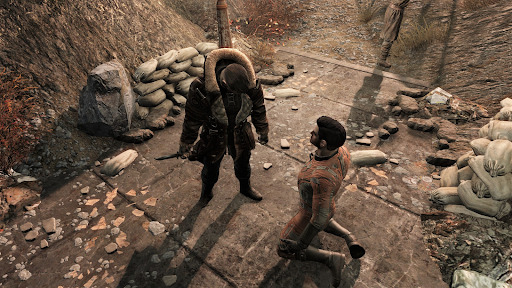
A few more fun facts about Gawain that resonate with Paladin Danse’s story:
He’s got a bunch of really shitty brothers. (No comment.)
Gawain (SPOILERS!) doesn't actually end up beheaded, but he does willingly kneel for his execution and gets a cut on the throat as a reminder of his sin. And, uh, Danse can also get his throat cut! It doesn’t end as nicely but it’s, you know, a thing that can happen.
Gawain might be a really good guy, and he tries really hard to be one, but in the end he’s nothing more than that: there’s nothing supernatural about him, he has no special powers beyond his own principles and devotion. He’s just a dude doing his Best.
Wait, why not Danselot?
Oh, that guy? Here’s the thing.
Lancelot personifies the continental ideals of courtly love that became popular in the High Middle Ages. Central to his story is the prioritization of personal relationships and romantic feelings in a way that you don’t really see in Gawain's, at least in the Green Knight tale. (Later stories hook Gawain up with an extremely delightful lady, but even that is a different flavor of romance than Lancelot's and has more to do with Gawain honoring his word and his egalitarian treatment of women (hell yeah). In the poem, Gawain is impressed by Bertilak's wife but resists her temptation; in fact, the biggest risk is not that he'll yield to her advances but that he'll be discourteous to her, i.e., violate his principles and cause dishonor to his king and his host.)
Lancelot is driven by passions over principles in a way that Gawain never really is (at least in the stories I’m talking about; later writers have committed character assassination to various degrees). Yes, you could argue that both Gawain and Lancelot betray their oaths, but Lancelot’s betrayal is never, um, blind. He knows what he’s doing and makes a deliberate choice to prioritize his love for the queen over his love for the king. It doesn’t make him a bad guy—he too is an ideal knight with one fatal flaw—but his character isn’t as comparable to Paladin Danse.
Yeah, Gawain is (in most stories) a prince and a kinsman of Arthur’s, but he’s ultimately a native boy who doesn’t break the mold of a Knight of the Round Table. Likewise, Danse is portrayed as competent and valuable to the BoS, but not exceptional or breaking the mold of what a BoS soldier should be: he simply represents the ideal. Meanwhile, Lancelot is a foreign prince who was marked from childhood as special and fancy, and his storyline goes alllll over the place. (Much like this post.)
For example, Lancelot goes to absolutely absurd extremes to prove his devotion for no other reason than to prove it. (“I’ll do any useless humiliating thing you want. I’ll betray every oath except the one I made to you. That’s what love is!”) Gawain would never. Danse would never.
Ultimately, Gawain's tests are of his character and not of his love. And like Gawain, Danse’s devotion is to service and his principles, not to another person—even Arthur Maxson.
All that said, there are some similarities: both are beloved by Arthur, both are held up as the ideal of what a knight should be. And even if their fatal flaws are different, both make the point that no matter how good and brave and loyal they might be, no human being can be perfect.
(Except Galahad. Who is, as a result, very boring.)
I’ll conclude this section with a quote from someone else’s take on the Greek Knight poem:
I like Gawain. He’s not perfect, but he’s trying his best which is all any of us can do. He’s not like the other knights in the Arthurian legends who occasionally ‘accidentally’ kill women on their little adventures and then feel hard done by when they have to deal with the consequences of that. Gawain holds himself to a high standard – higher, it seems, than Arthur and his knights hold him to considering how hard they laugh when Gawain tells them how bad he feels about the whole thing.
I think Gawain is very relatable in this story. We all want to be better than we actually are.
And that, more than anything else, is Danse.
The Grail myth
What’s that? Lost relics of power? Better send some large armed men after ‘em!
The parallels to the BoS’s tech-hoarding ways are obvious enough that the games themselves lampshade them (albeit by way of Monty Python). But it also ties into the larger themes of “purity” versus “corruption” and the BoS’s self-image as a bastion between civilization and chaos. (See Maxson's line in response to the Sole Survivor’s quip about the Dark Ages: “Judging from the state of the world, it wouldn't be a stretch to say we're living in that era again.”)
But the ultimate futility of the Grail mission is also worthy of note. The BoS might want the power of prewar tech on their side, but they’re no more to be trusted with it than any other group of human beings. No matter how they try, the “corruption” of humanity can’t be overcome as long as they’re striving to harness power for their own ends. You can only achieve power by surrendering control of it.
The death of Arthur
The nature of gameplay being what it is, it's not guaranteed that the Arthur figure will be fatally betrayed, bringing Camelot down with him—but it's not unlikely, either.

Awkward.
Some final spitballing:
Outside the Brotherhood, there are some fun parallels of the Arthur myth with the rest of Fallout 4. Betrayal by one’s own son, for example.
The key difference between the BoS and the legendary Round Table: King Arthur’s knights, for all their flaws and human weaknesses, are usually presented as unambiguous Good Guys. The BoS is... a little more ambiguous...
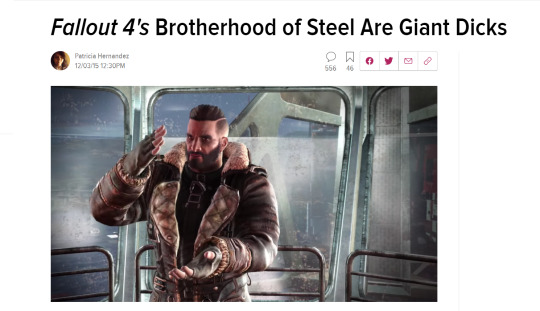
...but damn if they don’t think they're the good guys.
A-ad victoriam, fellas!
#fallout#fallout 4#brotherhood of steel#arthur maxson#paladin danse#sir gawain and the green knight#sir gawain#gawain#knights of the round table#king arthur#elder maxson#fallout 3#fallout lore#maxson#roger maxson#look mom I did a meta
325 notes
·
View notes
Text
@lansplaining encouraged me to finish this random meta nobody asked for, so let's talk about Meng Yao, Meng Shi, and 孟母三遷 (mèng mǔ sān qiān), a proverb about good parenting.
A warning: this is super long (even for me!) and is less quality meta and more my ADHD brain jumping around a maze of loosely related ideas. Proceed with caution!
Let me start by briefly going through why I decided to write this, because it’s important. In haunting Meng Shi’s tag in my starvation for Meng Shi content, I’ve multiple times come across the idea that Meng Shi pushed Meng Yao too hard, that she should’ve been more careful with teaching him to seek his father’s approval at any cost, and that she was too naïve. I’ve never reblogged this kind of post because 1) I personally think it’s rude to go out of your way to ramble about how much you disagree with someone on their own post and 2) if this was an isolated incident I wouldn't care either way, so I didn’t want to direct this rant at anyone in particular. It’s more to do with a tendency, primarily (as far as I can tell) from fans who haven’t had much contact with Chinese culture, to oversimplify Meng Shi and make her relationship with Meng Yao slightly disturbing, and I think part of it is due to CQL basically cutting out her entire storyline (so fans simply don’t have info about her to assess her fairly) and part is due to misunderstanding what a good parent is supposed to act like in the context of Ancient China.
[Of course, Ancient China is not a very useful historical concept, not any more than “ye olde Europe” - things change a lot based on time and place - but you know. It’s fantasy. Extremely broad trends are okay in this case.]
Anyway, the idea behind the posts I mentioned is, basically, that Meng Shi (usually through no fault of her own) is to blame for Meng Yao’s obsession with power, since his desire for approval was inherited from lessons she taught him. Just to start with, I’d argue that Meng Yao isn’t power-hungry as much as he craves security and respect, but that’s a different meta. Let’s assume that she really did teach him to be Like That. Was she wrong to do so? I’m not looking for “does that make for a happy, well-adjusted childhood?” or “would you raise your own son as Meng Shi did?” - I’m trying to figure out, would she have been considered a bad mother in the context of the society she lived in? I don’t think she would’ve.
It is surprisingly hard to find texts about the obligations of parents in Ancient China. Their main obligation is to raise filial children, but I feel like that’s not very useful: whether or not parents are good parents, children are expected to be filial, so a child being filial really says more about the child than about the parent. Maybe the parent completely missed the mark and society at large was what taught the child to be filial!
We can assume, of course, that parents were to raise good people, and that by learning what a good person looked like, we could figure out whether the parent was successful, but once again, I feel like that’s pinning things on the outcome, not on the process - the best of parents can end up with an awful kid and vice versa.
While thinking about all this, it took me a frankly embarrassing amount of time to remember the story of Mother Meng and Meng Zi, but once I did, it wouldn’t leave my mind - in part because the Meng here is the exact same Meng of Meng Shi and Meng Yao (yay! fun if useless parallel!), and in part because this is a story about how a woman can successfully raise a son by herself.
Okay, so important note: one of the most influential ancient Chinese thinkers is Meng Zi (孟子 Mèng Zǐ), who is known in the West as Mencius. If you've never heard of him - he's perhaps second in importance only to Confucius. When Mencius was still a young child, his father died, so he was raised by his mother, who is usually known only as Mother Meng (in Chinese, 孟母 Mèng Mǔ.)
Mother Meng's story is told in Biographies of Exemplary Women (列女傳 Liènǚ Zhuàn), which for around 2000 years beginning around the 18th century BCE, was the most commonly used book used to educate women. The book is divided into sections, each one showing a different way women could be honorable and good. Mother Meng's story is told in the Maternal Models section (母儀傳 Mǔ Yí Zhuàn.) The story has a few parts, some of which I'll quote, always from Kinney's 2014 translation.
Before I go on to quote it, though, I'd like to establish that Mother Meng's story is so, so famous that even if Meng Shi had never read this particular book, I'm almost certain she would've been familiar with at least the outlines of Mother Meng's story. I'm not cherry picking a suitable chapter from the book, I'm literally going with the most famous story in it because Meng Shi would be most likely to know this one if she knew no other story.
Okay, the first part of the tale takes place when Mencius is a young boy and Mother Meng is a widow raising him.
The mother of Meng Ke of Zou [a different name for Mencius] was called Mother Meng. She lived near a graveyard. During Mencius’ youth, he enjoyed playing among the tombs, romping about pretending to prepare the ground for burials. Mother Meng said, “This is not the place to raise my son.” She therefore moved away and settled beside the marketplace. But there he liked to play at displaying and selling wares like a merchant. Again Mother Meng said, “This is not the place to raise my son,” and once more left and settled beside a school. There, however, he played at setting out sacrificial vessels, bowing, yielding, entering, and withdrawing. His mother said, “This, indeed, is where I can raise my son!” and settled there. When Mencius grew up, he studied the Six Arts, and finally became known as a great classicist. A man of discernment would say, “Mother Meng was good at gradual transformation.”
According to the translator's footnote, "gradual transformation" is "a childrearing technique, whereby a child is morally formed through daily exposure to correct models of behavior."
From this story comes the proverb 孟母三遷 (Mèng Mǔ sān qiān) - "Mother Meng moved three times." It's come to mean that a parent - especially the mother of a male child - should spare no efforts to provide an environment that will give their child a good education, paying particular attention to what models are surrounding them.
I'm sure I don't need to say if Meng Shi was at all familiar with this proverb (and she would probably be), she must have been very stressed out over literally raising her son in a brothel. (Here I must mention sex workers in ancient China were often essentially owned by the brothels, so literally "moving three times" wasn't really an option for Meng Shi even if she could miraculously pick up another trade.) Meng Shi did however at least try to surround Meng Yao with the accomplishments appropriate for the son of a cultivator:
Xiao-Meng, are you still learning those things lately? [...] The things your mom wants you to learn, things like calligraphy, etiquette, swordsmanship, meditation… How are those things going? [...] His mom’s raising him as a young master of a wealthy family. She taught him how to read and write, bought him all those swordsmanship pamphlets, and even wants to send him to school.
Meng Yao actually talks a little bit about “those swordsmanship pamphlets” in the only time in canon he directly shares memories about this mother:
Lan XiChen, “Your [guqin] skills are also considered quite fine outside of Gusu. Were they taught by your mother?”
Jin GuangYao, “No. I taught myself by watching others. She never taught me such things. She only taught me reading and writing, and bought a handful of expensive sword and cultivation guides for me to practice.”
Lan XiChen seemed surprised, “Sword and cultivation guides?”
Jin GuangYao, “Brother, you haven’t seen them before, have you? Those small booklets sold by the common folk. First jumbled sketches of human figures, then deliberately mystified captions.”
Lan XiChen shook his head, smiling. Jin GuangYao shook his head as well, “All of them are scams, especially to fool women like my mother and ignorant children. You won’t lose anything by practicing them, but you definitely won’t gain anything either.”
He sighed in a rueful way, “But how could my mother have known this? She bought them no matter how expensive they were, saying that if I returned to see my father in the future, I had to see him with as much competence as possible so that I don’t fall behind. All of the money was spent on this.”
See what’s happening? Meng Shi cannot physically take Meng Yao to cultivators, but she spares no efforts in giving him the closest thing she possibly can -- figuratively, we might say she moved three times.
Of course, these booklets don’t work, but as Meng Yao says, how could she have known this? The cultivation world is very closed off - think of how the entire Mo household gathers to see Lan juniors, and how Wei Wuxian mentions once that “Cultivation families, in the eyes of common folk, are like people favored by God, mysterious yet noble.” Not just noble, but mysterious. That tracks, too - I mean, they live in inaccessible households and mostly leave to night hunt or visit each other, neither of which is an activity that would allow commoners to get much more than an occasional glimpse of them.
Now, if Meng Shi doesn’t even know that a pearl for Jin Guangshan was just a trinket, if she doesn’t know even the wealth of a major sect, how can she read booklets and decide whether that’s genuine cultivation or not? All that she sees is a chance for Meng Yao to be surrounded by the ideas and skills of the people she wants him to emulate - cultivators - and therefore she does everything she can to get him that chance. Mother Meng moved three times.
Okay, but maybe the argument is not “Meng Shi shouldn’t have pushed Meng Yao to cultivation” but rather “she should’ve pushed him, just not too hard." To that, I present another tale from Mencius' childhood:
Once, when Mencius was young, he returned home after finishing his lessons and found his mother spinning. She asked him, “How far did you get in your studies today?” Mencius replied, “I’m in about the same place as I was before.” Mother Meng thereupon took up a knife and cut her weaving. Mencius was alarmed and asked her to explain. Mother Meng said, “Your abandoning your study is like my cutting this weaving. A man of discernment studies in order to establish a name and inquires to become broadly knowledgeable. By this means, when he is at rest, he can maintain tranquility and when he is active, he can keep trouble at a distance. If now you abandon your studies, you will not escape a life of menial servitude and will lack the means to keep yourself from misfortune. How is this different from weaving and spinning to eat? If one abandons these tasks midway, how can one clothe one’s husband and child and avoid being perpetually short of food? If a woman abandons that with which she nourishes others and a man is careless about cultivating his virtue, if they don’t become brigands or thieves, then they will end up as slaves or servants.” Mencius was afraid. Morning and evening he studied hard without ceasing. He served Zisi [a great scholar whose grandfather was Confucius] as his teacher and then became one of the most renowned classicists in the world.
Notice that Mother Meng moved three times to ensure Mencius would have the highest of aspirations - to become a scholar. But just aspiration isn’t enough. Not by any means. Now that Mencius is actually studying, Mother Meng is willing to take an extreme action to ensure he's taking it seriously. Mencius doesn't have a father to smooth his path to success. He has to learn that aspiring to greatness isn't enough. He'll have to put in the effort as if his life depended on it. And if he doesn't persist in his hard work, everything he's done thus far will be useless. Sounds like a lesson imparted on young Meng Yao, doesn’t it?
A lot of fandom rage towards Meng Shi would apply to China's Best Mom Contender, Mother Meng. She gives her son big dreams, and teaches him how to go about achieving them in a society where failing is easier than succeeding. Yes, it's fair to say that Meng Shi taught Meng Yao to refuse to settle for anything less than being “Jin Guangshan's son, a respected cultivator.” Yes, it's also fair to say that she probably didn't allow him much time to play like children his age did. But unfortunately, in the world of MDZS, poor children probably wouldn't get to play anyhow, the difference is that they'd usually be working, not studying. Studying is a privilege! It’s a privilege Meng Yao could not afford but was given to him anyway, through his mother’s many sacrifices. We can even say that while she was alive, Meng Shi was trying to ensure Meng Yao would one day have a better life, at the expense of a fun childhood - and that's very Mother Meng of her, whatever our modern Western sensibilities might have to say about that.
Finally, I’d skip other tales (which show Mother Meng and an adult Mencius) and go straight to the poem that ends the Mother Meng section:
The mother of Mencius
Was able to teach, transform, judge, and discriminate.
With skill she selected a place to raise her son,
Prompting him to accord with the great principles.
When her son’s studies did not advance,
She cut her weaving to illustrate her point.
Her son then perfected his virtue;
His achievements rank as the crowning glory of his generation.
I’d like to focus on the last verse - “His achievements rank as the crowning glory of his generation.” All that Mother Meng wanted was for Mencius to not completely ruin his life, but he became great. You can so very easily see a parallel with how Meng Shi hoped Meng Yao would be a cultivator but he became Jin Guangyao, Chief Cultivator, styled Lianfang-zun, one of the Three Venerable, hero of the Sunshot Campaign.
Of course you can say “Jin Guangyao did many Very Wrong Things to get there, though!” Which, sure, okay, fair point. How many and how wrong depends on which canon we're discussing, and your own interpretation, but there’s no version of the story in which Jin Guangyao is 100% an innocent child uwu. But blaming that on Meng Shi is just... straight up weird? I don’t see anyone going “If Jiang Fengmian hadn’t adopted Wei Wuxian, he’d never have dared become Yiling Laozu!” and that’s pretty much the same logic. Would street kid Wei Wuxian have invented a new type of cultivation if he had never been taken in by the Jiang? Probably not, but raising undead armies is very much not something Jiang Fengmian could’ve predicted. In the same way, how could Meng Shi have predicted that teaching her pre-adolescent son “You are the son of a cultivator, act like one and earn your place in society” would’ve ultimately resulted in innocent deaths? How could she predict “You’re not destined to having the same horrible life I did, you can get something better than this” was a bad thing to teach? I quite honestly don’t know.
Finally, I'd like to point towards a much flimsier evidence that Meng Shi did great as a parent. And that is Meng Yao’s love. Nie Huaisang at some point comments Meng Shi is someone who Meng Yao "cherishes more than his life," and I think his assessment is correct.
Even putting aside the fact he built a whole temple to get his mother to reincarnate into a better life, and even putting aside how he refuses to flee the country without her remains, there's still crystal clear evidence that Meng Shi must've done something right. Because a lifetime of people using his mother to bully him doesn't seem to have made Meng Yao resent her. Had their relationship not have been very strong, odds are he'd feel bitter and/or ashamed of her. That doesn't seem to be the case. He's attached to her even decades after her death.
I want to be very careful with equating mutual affection with good parenting, though. When I was a rather rebellious teenager, my mother (in typical Chinese fashion) used to say that parents and children don't have to love each other as long as they're dutiful to each other, by which she meant that a parent-child relationship isn't informed by warm and fuzzy feelings, but by whether you'd be willing to do anything for each other. Specific to my case, she meant "I don't care if it makes you hate me, you will do as you're told because that's what's best for you." (That may also be the reason why people more familiar with Chinese culture see the Jiang family less as outright abusive and more as #complicated, but that's another meta.)
Whether your kid wants to hug you every time they see you is of no consequence to traditional Chinese thought - raising them to be the best they can is all that matters, because at the end of the day, you won't be around forever, but you can definitely set up your kid's life so that it goes smoothly and virtuously. How that's accomplished varies depending on many factors, but to have the goal be "I want my child to love me" rather than "I want to raise my child right" would've been considered selfish as hell.
So even if all that Meng Shi had given Meng Yao had been stern lessons about the need to go get his birthright, she would've still have been considered a good mother!! In fact, she would've been doing everything she was supposed to do, under extremely difficult conditions! (Remember the importance of environment? That Meng Yao grew up to want to be a cultivator despite having probably never even met one speaks wonders about Meng Shi's childrearing powers!!)
But just based off how over the top Meng Yao's filal dutifulness is, I'd go a step further and say that even as she did the impossible, she was also loving enough to inspire genuine affection. This is complicated because children who have present fathers could expect their mothers to be tender with them. The first century BCE text 禮記 Lǐ Jì or The Classic of Rites says that:
Here now is the affection of a father for his sons - he loves the worthy among them, and places on a lower level those who do not show ability; but that of a mother for them is such, that while she loves the worthy, she pities those who do not show ability - the mother deals with them on the ground of affection and not of showing them honour; the father, on the ground of showing them honour and not of affection.
But when the father figure is lacking for any reason, the mother must abandon her tenderness because someone must guide the child, and without a father, the role falls to the mother. A single or widowed mother had to be very careful to not smother their children with affection and raise useless, spoiled kids, or so it was thought. (The presence of Qingheng-jun and Lan Qiren is why Madame Lan can be so affectionate with the Lan boys, by the way - if she was raising them by herself she would've been expected to be much more practical. AUs where she just gets her kids and runs away could do very cool things with this idea. But I digress!)
Where was I? Oh, okay. Because Meng Yao seems to not just respect, but actively miss her, it seems that Meng Shi somehow managed to deal with her son on the ground of both honor and affection, to paraphrase.
So basically, all things considered, it seems not only would Meng Shi have been considered a great mom (if people could look past her being a prostitute, anyway) but she also went above and beyond the bare minimum. She truly spared no efforts on any front to make sure her son had everything your average gongzi would have - someone to teach him and someone to love him, access to education and confidence in his birthright. That she couldn't actually make him a cultivator, that she couldn't actually raise him in a proper home with no one being cruel to herself or him - that's immaterial. Even Mother Meng couldn't control what her neighbors did, only what she taught her son! The key point is Meng Shi tried. She did everything she could to educate her son right. You couldn't ask more of her, and quite honestly, you should probably be asking less.
Of course we can't err on the other extreme and say she was Perfect. Given MXTX only ever writes flawed characters, we can safely assume that if we'd known more about Meng Shi, we would've seen many flaws. Indeed, just the fact she didn't teach Meng Yao the guqin when he apparently wanted to learn it might point to some conflict we don't know enough to speculate about (maybe she focused too much on cultivation when Meng Yao's interests lay elsewhere? Maybe she wasn't able to sufficiently shelter him and he felt it'd be a burden to ask her to teach him anything? Maybe maybe maybe, go wild with your fics.) Nevertheless, I would never hold a female character to a higher ideal than a male character - if the male cast of MDZS can be a hot mess and still be admirable for what they're trying to do, then so can Meng Shi.
At the end of the day, when I look at Meng Shi - and I've made myself a document with all the references to her in the novel canon so I could easily contemplate her life and character - all I see is a woman every bit as determined and resourceful as her son, willing to do everything it took to raise her little boy into the sophisticated and ambitious man he became.
Finally, here's a fun little parallel that I'm 100% sure was unintentional but I still love. I said Meng Shi couldn't have moved three times. She couldn't, but I think maybe she taught her son he was worth moving three times for. Qinghe Nie. Qishan Wen. Lanling Jin. Isn't that super fun to think about?
Alternatively, tl;dr: Oh My God I Can't Believe We're Blaming Women For The Actions Of Their Adult Children In The Year Of Our Lord 2k21, Meng Shi Was Doing Her Best, Chill!
#drinking game#take a shot every time i say 'finally'#this post refused to let me get to the end of it lol#i think because i'm extremely salty about fanon stage mom meng shi#(to not say tiger mom meng shi which crosses into outright racism. but i'm giving people the benefit of the doubt)
164 notes
·
View notes
Text
contextualizing lwj’s coming to terms with his feelings subplot!
i wanna talk about the role of confucianism in this subplot because i think it’s something some western fans might not pick up on. basically, the sociopolitical climate of confucianism in his character arc, and a little bit about his interaction with the public image theme.
disclaimer: i’m not chinese but i do have a double minor in chinese and asian studies and have written a few papers on confucianism.
we’re gonna be talking about the novel bc i feel its a little more in-depth and nuanced than lwj’s “what is black, what is white” monologue in cql. namely the tension and misunderstanding in wwx’s first life and how lwj got his scars. i feel like it’s pretty well accepted that wwx made lwj reconsider his world view, so i’m just gonna expand on it. also i want to point out it's pretty unspoken in most of the text, but lwj is also affected by/used to explore the public image themes, as his image the is ideal confucian scholar.
confucianism is centered around the ideas of how to behave “good” in sociopolitical contexts. basically it boils down to a belief system on how society should be run. if everyone follows confucian beliefs, you will have an ideal society. the main text is the Analects, which you can read here. it’s been around for a few thousand years (like around 200 BCE ish), had a huge revival in the tang dynasty (618-907 CE). it was put on imperial exams, the emperor’s cabinet had confucian scholars, etc. this is just to say confucian values are important to historic society, especially upper-class scholars, which seems to be a role cultivators commonly fill in xianxia. here are some basic tenants:
being a gentleman/scholar/superior man (君子 jūn zǐ) : partly being learned in the arts, literature, music, poetry, etc., mostly behaving righteously and dutifully.
filial piety: usually described as obedience. it's not simply obeying everything elders tell you, it includes doing it with reverence and thankfulness for their sacrifices for you.
leading by example: if leaders/the government is righteous, the people will follow. lwj has his flock of juniors that are all strong cultivators and the lan sect is just generally known for being moral and good.
rites/rituals: a focus on politeness and holding proper ceremonies, sacrifices, and funerals
speech: there’s some great meta about the register he speaks in here, i just want to touch on think carefully before you speak, only speak sincerely, etc.
tldr; lwj is THE perfect gentleman (even his title contains the character suffix 君 -jūn, like lxc. which, while this character is not uncommon for cultivator titles, it wasn’t chosen carelessly either. also not to be confused with 尊 -zūn). seriously, look at almost all of book 10 and you'll see don't do/consume in excess, don't talk during meals, sit only when your mat is straight, etc.
okay, so Why is understanding his feelings for wwx so troublesome?
1.2 "They are few who, being filial and fraternal, are fond of offending against their superiors. There have been none, who, not liking to offend against their superiors, have been fond of stirring up confusion... Filial piety and fraternal submission! - are they not the root of all benevolent actions?"
in other words, people who are filial will never create political tension. so like, morally, wwx should be considered horrible person! he’s not only snubbed the jiang sect. he was a head disciple who undoubtedly had younger students looking up to him. and then he goes and stirs up some huge political issues! he is now a bad role model for the people below him and disrespected the people above him. lwj has an entire image to uphold, he has poured his entire life into following these rules and beliefs, and then wwx comes along. would continuing to be in wwx's life taint lwj? there are some contradicting teachings in regards to interacting with wwx:
15.4: "Do not take counsel with those who follow a different Way"
15.28: "When the multitude hates a person, you must examine them and judge for yourself. The same holds true for someone whom the multitude love."
15.36 "When it comes to being Good, defer to no one, not even your teacher."
this is part of the reason lwj had so much trouble accepting his feelings. he didn’t know how to handle this situation, making him appear distant during/directly after sunshot. if he judges wwx's intentions to be pure, it's then not wrong to be friendly with him. but wwx still is morally wrong by society's standards. now, lwj has to not only figure out his feelings, but also reconcile this with how he still thinks wwx is Not a bad person, despite everything. what if he does get "tainted" by wwx? will it hurt the reputation of his sect? that would be un-filial, right? he spent his whole life memorizing rules that are probably extremely similar to sections in the Analects, and now these mixed messages (coupled with the relatable gay panic) are overwhelming.
onto the next! there’s something unspoken in the scene where wwx discovers why lwj has the whip scars. as other posts have mentioned, lwj taking wwx back to the burial mounds and nursing him is high treason. however, this action is also extremely un-filial. also his entire image is built around being a perfect gentleman, if this were to get out to the public he would lose absolutely everything. he would be just as irreparable as wwx.
“I was worried if those from another sect found you first, WangJi would be considered your accomplice. The best scenario was his name being forever tainted, and the worst was his life being taken away right then. Thus, along with Uncle, we chose thirty three seniors who had always thought highly of WangJi... ”
there’s no way lwj didn’t know what would happen if he did this. obviously as lxc says, if this got out, he would lose basically his entire face. and even though lxc didn’t mention this, it would definitely lose a lot of face for the lan sect as well since lwj is so prominent. the decision about what elders to bring is also notable.
“...As if he knew all along he would be discovered by us, he said that there was nothing to explain, that this was it. Growing up, he had never talked back to Uncle, not even once. But for you, not only did WangJi talk back to him, he even met with his sword the cultivators from the Gusu Lan sect...”
so yeah, he obviously knew they would come for him and what the consequences would be. and he still talked back! that’s already not a good look for the lan sect. but attacking them? totally unforgivable! lwj gives up how he was raised and the importance of filial piety, what he has held on to until this major plot event. since it's basically the biggest "fuck you" to his uncle and his clan, this was not a decision he made lightly. lwj shows them he cares more about wwx and His Own ideas of right and wrong than the sect’s or society’s.
Wei WuXian dug his hands into his hair, “...I-I didn’t know... I really...”
when was the last time wwx was at a loss for words? wwx spends a few paragraphs after this lamenting how he hurt lwj, but he's not unaware of the gravity of what lwj did. it's an underlying assumption from being raised in the culture. i would argue his first instinct is "oh god he gave up what for me?" since those lamenting paragraphs are after lxc finishes speaking.
"But he said... that he could not say with certainty whether what you did was right or wrong..."
this is something thrown around a lot in the Analects, that not even confucius can say for sure what is right or wrong. what better way to show lwj is still a perfect confucian than have him paraphrase confucius himself?
“...WangJi was a model for the disciples when he was young, and a prominent cultivator when he grew up. In his whole life he had been honest and righteous and immaculate--you were the only mistake he made!”
here’s the confirmation that the world and even his family thinks of him as a perfect gentleman, the top tier of society, and it was all thrown away for wwx. this is just so heavy. the mistake thing? thats not only because lwj is fraternizing with an enemy. lxc and the rest of the sect who knew are terrified this will forever corrupt lwj personally, not just publicly. lwj was so devoted to believing this was the right thing to do he offered up everything he had. the gravity of this decision is insane. it’s very obvious that he loves wwx, it’s just that he struggles a lot internally to accept everything that is happening.
as for helping wwx leave after the massacre, is this gentleman-ly of lwj? was it actually in-line with his image? is it more honorable to save someone who is dying, at the cost of your own health, than to look away? isn't looking away a form of resentment? i wasn't able to find a specific passage about bystander-ness, but personally i think it qualifies as "bad intentions." there is also this passage for what it's worth, originally it was about government suppression:
12.19: "...What do you say to killing the unprincipled for the good of the principled?" Confucius replied, "...why should you use killing at all?..."
lwj is always more actions than words, and he was not fucking around. his core beliefs really haven't changed, and remain very strong throughout his life. he is still righteous enough to accept his punishment, graceful enough to search for wwx's body since there was no one else to do the funeral rites (10.22/10.15), caring enough to take in a-yuan, upright enough to still spend his years going where the chaos is.
just with this one action, the audience knows he has come to terms with realizing that authority isn't always just, and neither is the public opinion/opinion of other gentlemen. he has reconciled. this is him standing for what he believes is right. this is his devotion. this is his own choice. just. poetic cinema...
anyway that's it for my first meta post! i would love to hear your thoughts, feelings, opinions, discussions, other meta ideas, whatever! thank u for reading! <3
#its My post and i get to pick the subplot#i have...brainworms#wwx and lwj are foils in the public image theme change my mind#mdzs#mdzs meta#lan wangji#mo dao zu shi#stfu#meta
390 notes
·
View notes